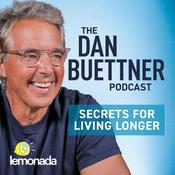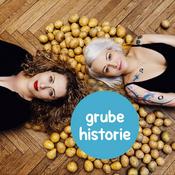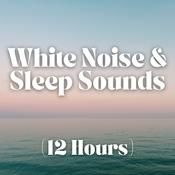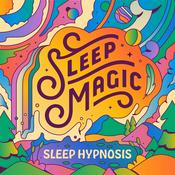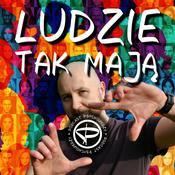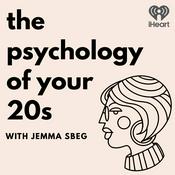239 odcinków
- You're listening to Burnt Toast. I'm Virginia Sole-Smith. Today my conversation is with Dr. Lauren Muhlheim.
Lauren is a psychologist, a fellow of the Academy for Eating Disorders, a certified eating disorder specialist and approved consultant for the International Association of Eating Disorder Professionals. She's also a Certified Body Trust Provider and directs Eating Disorder Therapy LA, a group practice in Los Angeles. Lauren is the author of When Your Teen Has an Eating Disorder and a co-author of the brand new The Weight-Inclusive CBT Workbook for Eating Disorders.
Lauren joined me to chat about how she and her colleagues have been working to make eating disorder treatment less fatphobic, because, yes, that really needed to happen. We also get into why it's feeling harder than ever to treat eating disorders, or live with one, in this era of RFK, Jr., MAHA and GLP-1s.
Plus what to do if your child is hiding food, lying or otherwise showing signs of developing an eating disorder. When do you intervene? And how do you do so in the most supportive way possible?
If you enjoy this conversation, a paid subscriiption is the best way to support our work!
Join Burnt Toast
🧈🧈🧈🧈🧈🧈🧈🧈🧈🧈🧈🧈🧈🧈
Episode 231 Transcript
Virginia
I am really delighted. We have been, I guess I would say, colleagues in this space, or comrades in this space, for a long time.
Lauren
Comrades, for sure.
Virginia
I've interviewed you for articles over the years. We're both in the fat activism world in various ways. You're someone I learn so much from. I'm very excited to have you here today. We are going to talk about your new workbook that comes out this month, called The Weight-Inclusive CBT Workbook for Eating Disorders. Do you want to give us a little background on how this workbook came to be? Then we're going to dive into my list of questions.
Lauren
I should introduce CBT for eating disorders. CBT stands for cognitive behavioral therapy for eating disorders, which is one of the leading treatments. I was trained in it back in the 1990s by one of the two main researchers who's credited with developing the treatment. Cognitive behavioral therapy looks at what's maintaining a problem in the present. It looks at the relationship between thoughts, behaviors and feelings, and helps to sort out ways to solve problematic behaviors related to eating.
Fast forward to present day, we've learned a lot more about eating disorders than back in the '90s when I was trained in the model. When I was trained, it was very weight-centric, focused on primarily low weight and "normal weight." You know, thin-ish white women, and that's who was largely studied.
But now we know so much more - that eating disorders affect all people, all genders, all ethnicities and all body sizes. As I've evolved as a clinician over the last 20 years, I've really become influenced by the weight inclusive movement, Health At Every Size and listening to people with lived experience who have experienced harm from traditional weight-centric treatments.
So I have evolved. And in my mind I had modified what I was doing, and when I went back to look at the manuals, I was horrified to remember what was still in there that was really weight-centric. This has been a passion project for the last eight years. I've collaborated and talked to different people about it. I ultimately teamed up with two colleagues who were as passionate as I am, and we came up with the idea of modifying CBT to be weight inclusive.
We coined CBTWI to be weight inclusive, and we took the 30 year old manuals and updated them to be relevant to today and to speak to people in all size bodies. A lot of people come to us in bigger bodies and the old manuals were so harmful. You know, focusing on about being the right weight and other elements that were just not conducive to people in larger bodies when they go through this work.
Virginia
Can you give a specific example? For folks who've never been in eating disorder treatment, or just don't know the world well, it's like, 'What do you mean eating disorder treatments are not weight inclusive? Isn't that where you go to feel better about your body?' Give an example of what CBT used to do that was harmful, and how you've updated it.
Lauren
When I was trained in CBT, I always thought it was a non-diet approach, because the focus is on regular eating and including all foods. So the center of the model is still good. But some of the fatphobic elements that were in the original treatment were - one was this insistence on regular weekly weighing and the client knowing their weight. And that if the therapist refused to weigh the client weekly, it was the therapist's own anxiety and avoidance of tolerating the client's distress over being weighed. But if you're in a bigger body, being weighed is more than just exposure. It can be traumatic.
Virginia
Yeah.
Lauren
We don't need to put people through that, where every week they see their weight. So that's one of the first things that we eliminated.
The other thing, there's behavioral experiments with a focus on challenging what they call the broken cognition. The broken cognition is this belief, and again, this was developed on primarily thin, white women who had the belief that if 'I eat a cupcake, I'll gain five pounds.' The behavioral experiment was to have them eat a cupcake, weigh them before and weigh them the following week, and prove that they didn't gain five pounds, but that's also hugely fatphobic. Because you're trying to prove to people that it's all in their heads, that weight stigma is not a thing.
Virginia
Well, and you're saying, 'Look, the scary, terrible thing didn't happen.'
Lauren
Which reinforces that that's the scariest thing.
Virginia
Even what you're saying, weighing folks in bigger bodies can be traumatic, not because inherently it's bad to be in a bigger body, but because if you're in a bigger body and you've been weighed in medical settings, you've had that number weaponized against you for so long. That's the trauma you're alluding to.
Lauren
Yes, exactly.
Virginia
I see, so it was a lot of methodology around weight numbers meant to reassure thin women that 'Don't worry, you won't get fat.'
Lauren
Exactly.
Virginia
Which really leaves out any fat person with an eating disorder, and doesn't really do the thin women any favors either.
Lauren
Right. Because it just reinforces this fear that weight gain is the worst thing that could happen to somebody.
Virginia
That's fascinating. It sounds like a lot of very much needed updates and a really terrific resource for folks. I saw in the back of the workbook under Resources, you listed Burnt Toast as one of the newsletters with an online community dialogue. It means a lot to have us spotlighted in this way. We do work hard to have our chat rooms and safe spaces in the comment section for folks coming for support. You also listed a lot of folks that we love and look to as leaders in this space: Christy Harrison, Ragen Chastain, Rachel Milner, Sabrina Strings, Bree Campos, Chrissy King, etc. How do you think about the importance of community in the work you do with your clients as you've been reframing CBT in this way?
Lauren
We are big fans of yours and all the people you've named, and it was really important to us because here we are, three white women with privilege doing the updating of CBT and we wanted to take it further.
It was really important to us that we learned from people with more marginalized identities. We negotiated with our editor to have sensitivity readers and we had people advising us on some of the things that we might not have been as aware of, like food insecurity, gender considerations, and the experience of people in larger bodies. As references, we tried to include some of the thought leaders that we've really learned from.
Community is super important in this work because we're asking people to go against the grain of society. Many of the people that come to us for help with eating disorders are people in larger bodies who have been told by medical doctors and people in their lives to lose weight. And then they come to us and we say, 'Well, you're not eating enough.' And they think we're kind of crazy to say that.
It really helps when you're asking people to do this work, which is so hard, to have other people in their lives who are supporting this. Many people don't have people in their personal lives who are anti-diet. Where do you find those people? A lot of it is online and in podcasts. I always tell people it helps, even if it's you and me and the person listening to the podcast. They're hearing the interviewer and the guest and there's two other people who are in this world with you.
Virginia
That's right.
Lauren
It helps a lot. And I do think that is the missing piece for people in bigger bodies who experience disordered eating - they don't have the support.
Virginia
Especially right now. We're in a really dark cultural moment. You know, just like a swirling vortex of badness in a lot of ways. So it feels even harder, because what the federal government is telling us, what we're seeing in the news, etc, etc, is also running counter to what will actually promote healing.
To that end, I'd love if we could talk a little bit about how you're thinking about your work in this dark time. We just had RFK’s latest USDA dietary guidelines come out.
Lauren, how are you feeling about the new food pyramid?
Lauren
Sadly, I feel like I am not going to be able to retire anytime soon. The culture just propagates and perpetuates disordered eating in so many ways. Obviously eating is so much more individualized than just following a guideline, but what I can say is that I have never seen a person with binge eating who was not restricting their carbs.
Virginia
That’s really interesting.
Lauren
Carbs are basically the building blocks of what we eat, and they should be. A lot of the people who complain of what has now been popularized as the term "food noise," are not eating enough, and especially not eating enough carbs or starches. I expect that we'll see many more people coming in saying, 'I'm preoccupied with thoughts of food,' or 'I'm bingeing,' or 'I'm emotionally eating.' In our work, and what our workbook focuses on, is 'Are you eating enough regularly throughout the day? Are you including the various food groups? Are you eating enough starches and fats?' That's the mainstay of recovering from an eating disorder.
Virginia
Feeding your brain.
Lauren
Your brain needs glucose to think logically.
Virginia
Yeah, and not just at the tiny bottom point of the pyramid, but throughout the day. This is something I've learned from you that I want to make sure we say really clearly, because I think it's something people know but lose track of in their own work on these issues. Often folks come to you and say, 'I binge eat. I'm out of control with food.' When you start working with them your take is quite different.
Lauren
Right. All the eating disorders are really driven by restriction or not eating enough, and it's true that most people come to us and think they're eating too much. They're complaining about emotional eating or binge eating.
As a cognitive behavioral therapist, one of the things that CBT therapists do is ask people to keep records. Early on I was taught to have people record what they're eating, and that really offers an insight into what's going on. In my group practice, we do a lot of training of more junior clinicians, including graduate students. It's really exciting to me when I have a graduate student who's been with me for a couple months, and I say, "Well, what do you think the diagnosis is?" And they'll say to me, "Well, I'm waiting to see the food records because the person's complaining that they're eating too much." But they know from having been through this a few times, that when you see what someone's eating, you see a lot of restriction, a lot of skipped meals, a lot of very sparse meals.
People really do think they're eating so much because the culture is so focused on eating these very low intakes, and that's been kind of normalized on social media by wellness culture. People are really shocked when we tell them that they need to eat more, and that is the biggest part of it. Regular eating is kind of the antidote to all disordered eating. In our workbook, we're always like, 'Are you sure you're eating enough?' And I don't want to reinforce dieting by teaching someone strategies to prevent binge eating when they're not eating enough because I'm not going to be successful at that. Because that's the hunger drive and that's what keeps us alive. People may have short term strategies that work, but I definitely don't work on stopping the binge eating or the emotional eating until someone is really eating enough.
Virginia
Eating enough to support the idea that you would eat less at this one point in the day.
Lauren
And then most often, a lot of the binge eating and emotional eating decreases once people start to eat more regularly at meals and snacks. The food noise goes down.
Virginia
Let's talk about food noise. The rise of GLP-1s has really popularized that concept, but also, I would say, as you noted, misdefined it in many situations. How is all of that discourse impacting your work with your clients right now?
Lauren
It's definitely impacting us. We are seeing a lot of people coming in on GLP-1s, or contemplating GLP-1s. We always need to distinguish people who are on GLP-1s for medical conditions versus people on them solely for weight loss.
One of the problems with being on them for weight loss is that they're on higher dosages, and that's where you get more side effects. We do get some people who come in complaining of binge eating or emotional eating, and then they're on a GLP-1 and they suddenly have no appetite. It's harder to get them to eat enough throughout the day.
Virginia
Right. If you're trying to go back and say, 'Wait, let's look at where you're restricting,' and now they can't access any appetite to eat.
Lauren
Or they're nauseous and throwing up.
Virginia
Oh, God.
Lauren
We have been successful in a number of cases in helping our clients advocate for their doctors to actually lower their doses. Sometimes that helps, but there's a lot of nuance, right? I think we don't know enough about the full impact of these medications. Might there be some benefit for people with eating disorders in certain circumstances? Maybe. But it's a scary thing, and it definitely makes our work harder when we're focused on trying to get people to eat regularly throughout the day.
Virginia
That concept's been getting a lot of media attention, GLP-1s as an eating disorder treatment. But it sounds like you have major reservations about that idea.
Lauren
Because it does the opposite of the work we're trying to get people to do. Cognitive behavioral therapy is the best validated treatment. It was developed in the '90s and there's a lot of research to support it. The model is regular eating, including all foods, not being restrictive. And symptoms typically get better. We know that with weight loss, most people don't keep weight off long term.
Virginia
Right, and most people aren't able to stay on these drugs long term is also what we're seeing in a lot of research now.
Lauren
We do see some people who have been on GLP-1s and then they go off them and their weight is increasing and maybe the binge eating is coming back and starting again. It's a bit of a quick fix. That doesn't solve the problem.
Virginia
It's just rooted in that old thinking of binge eaters must eat too much, take away their appetite, solve binge eating, as opposed to what you've been steadily making the case for. And all the evidence is showing binge eaters are responding to restriction. And so a drug that encourages more restriction, how would that long term solve binge eating?
I would love to also talk a little bit about managing eating disorders and disordered eating in kids. You specialize in teenagers. Whenever I have a reader or a friend, as I now parent a middle schooler, reach out with concerns. I'm always like, 'Check out. Dr. Mulheim's work. This is your first stop.'
You're a big proponent of Family Based Treatment, FBT, for adolescent eating disorders. On your website you wrote, "I do not believe that parents cause eating disorders, but I know they can be an important part of the solution. Hence, I'm an advocate for the inclusion of parents in the treatment of their children."
Let's talk a little bit about how parents can help. What behaviors and symptoms do you take seriously? How do you be part of that solution?
Lauren
The first thing is that eating disorders in children and teens is harder to spot than you think. My advice to parents is, if you have concerns, definitely check them out. Some of the signs we see are stopping eating certain foods, eliminating dessert or not eating meals and saying they've already eaten. We may not see weight loss in in a child or a teen. They may just fail to gain, because remember, they're supposed to be gaining over time. Sometimes they're growing and they're not gaining, and that's the equivalent to weight loss in an adult.
We also see things like social withdrawal. What looks like depression, poor sleep, or loss of interest in activities. It can look like depression or anxiety. Or complaints of stomach aches. A lot of parents go down the gastrointestinal route, trying to figure out what's going on. It can be very confusing. Family based treatment is a wonderful evidence based treatment. It was developed at Stanford and it's a manualized treatment that basically allows teens to recover in the home. Because traditionally, teens were pulled out of the home. Parents were blamed. There was this saying about how it was always the mother's fault.
Virginia
Of course. Clearly.
Lauren
Clearly following on the trend of the schizophrenogenic mother, the autistic mother.
Virginia
We cause autism. We cause eating disorders.
Lauren
That has really perpetuated. I still meet people who say it must be the parents. I try to remember we're all in this culture and parents are doing their best. Parents are getting diet messages from all these other health professionals in our culture. I try to remember that they become the messengers of the cultural message. There is often dieting in the home, but does that cause eating disorders in itself? No. And we see that because not all siblings develop an eating disorder. A lot of parents diet and their kids don't develop eating disorders. We have to give parents a chance. The great thing about FBT is it's done through family meals and normalizing eating all foods. It's a great chance for families to come together.
I find it very powerful when the parents are unlearning their diet culture with their teens. They're able to do that. Sometimes it's a little bit of a hard wake up call, but most parents can get on board pretty quickly. It's really powerful when you see a whole family change the way they've been eating. It gives the parents a chance to learn the information. Whereas if the teen goes off to residential, the family doesn't come along and then the teen goes back into that home, so it's challenging. It's a lot of work for parents because they become the treatment team.
Virginia
It is a lot of sitting at the table with a kid who doesn't want to eat, which, any parent, regardless of whether they've managed an eating disorder, can tell you that's a nightmare. That's really hard to do and often it can feel counter to some of the other messages we get. If you're looking at the Ellen Satter model of feeding kids, it will be very much not forcing kids to take bites, and in FBT, when you have a kid refeeding after a lot of restriction, you do have to require them to eat. And that feels really strange.
Some of the interviews I've done with families who've done this, it is so moving to hear the parents work through their own stuff and come together in a different way to support the child. It's pretty transformative.
For parents who are noticing some of the early symptoms, like hiding food, or kids may be lying about what they're eating, how do you recommend parents manage things in those stages? Like, okay, I'm keeping an eye. I'm probably going to talk to the pediatrician. Probably going to, you know, do I need to level this up? And also, how do I react in the moment to some of this stuff?
Lauren
With as much compassion as they can, and in a non-shaming way. If you think that you know your kids are lying about what they're eating or hiding food, we really want to just encourage them to eat more with you. Which, again, this comes back to all eating disorders require people to eat more. If someone's hiding food, maybe they're not getting enough at meals. If someone is refusing to eat meals, they're not getting enough at meals. It's a good chance for parents to be more watchful, to try to make sure that meals are eaten and that teens and children have access to a variety of foods. That they're getting their nutritional needs met.
A lot of parents, again, because the cultural messaging is so intense, think people should be eating less. If you've taken care of a growing teen, you see how much they need.
Virginia
How much your grocery bill has increased.
Lauren
Parents may not be aware that their teens are supposed to be going through growth spurts. I do some trainings with Rebecca Peebles, who's an amazing pediatrician, and she emphasizes how teens are supposed to gain about 50 pounds as they go through puberty. Where are you going to get that weight if you're not eating enough. The growth pattern for a lot of kids is to grow out before they grow up. There's supposed to be this weight gain. We observe teens who are starting to gain weight to fuel this growth, and then someone panics, whether it's the pediatrician or a parent or the child themselves, and they start to restrict. That's the prime time for when anorexia can strike. If they had been left alone, they would have just gained and grown. Now you have to do all this work to get them back to that weight so that they can start to grow again.
Virginia
I think that's so helpful to normalize. This is what we want our kids to be doing. I'm parenting middle schoolers and I am shocked sometimes how fast a group of 12 year olds can empty the snack cabinet or the ice cream freezer, but this is what we want them to be doing right now.
When you see that hiding food behavior, parents often think they need to correct that behavior, instead of stepping back and thinking about what led to the hiding. And is this a food that you've given a message they shouldn't have as much of? Or as you're saying, are there other parts in the day where they're not getting enough? I also think a lot about the schedules these kids are under. They're at school all day, then they're going to sports or play rehearsal. My kid was out of the house for 12 hours yesterday. She was starving when she got home, and if you are coming with a diet mindset, you might be alarmed by that. But it completely makes sense that she didn't have enough time to eat during her school day and needed to make up for it.
Lauren
Yeah.
Virginia
Well, this is so helpful. Your work is reassuring and grounded. Whether folks are dealing with an active eating disorder or not, if you're parenting teens, if you're working on your own stuff with food, Lauren's work is an incredible resource. The workbook is really great, so thank you for that.
Lauren
Thank you.
🧈🧈🧈🧈🧈🧈🧈🧈🧈🧈🧈🧈🧈🧈
Butter
Virginia
So we wrap up every episode of Burnt Toast with butter, which is our recommendation segment. Do you have any butter for us today?
Lauren
I've been having a lot of fun with gardening fruit trees in Los Angeles. It's been really fun. I just recently pruned a peach tree to get it ready to hopefully bud and produce fruit. Peach trees have to be shaped in a certain way. You don't want the central leader you've got to have key branches. So I studied, and then you have to reduce the fruit, which is very sad.
Virginia
Oh, you have to cut off baby fruit.
Lauren
You have to cut off baby fruit because otherwise it just produces too much. You want to select which peaches are going to get bigger. That's been fun. And I'm growing an avocado tree. Pretty soon I have to go outside and spray it with sugar water to encourage the bees.
Virginia
Amazing.
Lauren
To hopefully pollinate it. I love that. I've been hand pollinating my passion fruit vine, which is a whole other thing.
Virginia
I am so jealous that you can do all of this outside. I am currently raising a indoor orange tree because I live in New York and it is 20 degrees today. It is stressful. I have to tell you, Lauren, I don't think she's living her best life right now. I mean, who among us is in this time of year, but I just added a humidifier because I got a hygrometer. She was starting to lose leaves and her humidity was only 22% because it's so cold, even inside my heated house. It's so cold and dry.
So my butter is going to be my humidifier for my orange tree. I'm hopeful, because she's got fruit on her, and it's starting to ripen, but she's dropping leaves because the air is too dry. It's high stakes over here right now with the orange tree.
Lauren
Being able to grow outside.
VIrginia
It's more logical than what I'm doing, but I just love the idea of fruit trees. We do have, in my garden outside, blueberry bushes, raspberry bushes, all that stuff. But I wanted year round joy.
Lauren
In California we have to get the no freeze hours berries.
Virginia
It's a whole different world over there. Fascinating. Well, yay! Here's for fruit trees for everybody! I don't know if I want to recommend everybody get an indoor fruit tree, because it is quite a project, but she is bringing me a lot of joy, as well as I'm stressing and over there filling her humidifier twice a day.
Lauren
Right? It’s a lot of work to take care of these trees.
Virginia
But I'm on it.
Lauren
I'll be back spraying my avocado tree with sugar to invite the bees.
Virginia
You know what? There's also something to be said for an obsessive hobby right now to just give you a little thing to focus on. I can do this. I can spray this tree with sugar water. Because there's a lot we can't control. So you know what? Fruit tree farming seems like a great use of energy.
Lauren
And then you get to eat them.
Virginia
Yes, exactly, and that's what I'm really excited for. And make delicious beverages and whatnot.
Lauren, tell folks where we can find you. How we can support your work.
Lauren
My website is https://www.eatingdisordertherapyla.com/. That's where my group practice information is, and my books are listed there. I have blog with a lot of resources for people with eating disorders, and for parents. My books are available wherever you buy books. They're both by New Harbinger Publications and The Weight-Inclusive CBT Workbook for Eating Disorders is available now.
Virginia
Amazing. We'll link to all of that. Thank you for being here.
Lauren
Thank you so much for having me.
Thanks for listening to Burnt Toast. If you enjoyed the conversation, please support our work with a paid subscription. They start at just $5 a month, and you'll keep Burnt Toast an ad and sponsor free space. Learn more at https://www.patreon.com/virginiasolesmith/join.
Make sure you are following us for free in your podcast player. Scroll down wherever you're listening, tap the stars, five of them please, and leave us a review. That really helps us grow and helps new listeners find conversations like these.
The Burnt Toast Podcast is hosted by Virginia Sole-Smith and Corinne Fay. You can follow Virginia on Instagram at @v_solesmith and on Bluesky at @virginiasolesmith.bsky.social. You can follow Corinne on Instagram at @selfiefay, on Bluesky at @corinnefay.bsky.social and on Patreon at Big Undies.
This podcast is produced by Kim Baldwin. You can follow Kim at @theblondemule on all platforms and subscribe to her newsletter at The Blonde Mule.
The Burnt Toast logo is by Deanna Lowe.
Our theme music is by Farideh.
Tommy Harron is our audio engineer.
Thanks for listening and for supporting anti-diet, body liberation journalism! - We are Virginia Sole-Smith and Corinne Fay and it’s time for a BONUS January Indulgence Gospel!
This episode is free for everyone. If you enjoy it, consider a paid subscription to Burnt Toast! It's the best way to support our work and keep this an ad- and sponsor-free space. You'll also get behind some of our most popular paywalled episodes like:
🧈 Why is Katie Sturino Working for Weight Watchers?
🧈Don't Go On the Pete Wells Diet
🧈The Mel Robbins Cult of High Fives
And more! (Find every Indulgence Gospel episode here.)
Never miss another episode! 🧈🧈🧈🧈🧈🧈🧈🧈🧈🧈🧈🧈🧈🧈
This episode may contain affiliate links. Shopping our links is another great way to support Burnt Toast!
Episode 230 Transcript
Virginia
So today we are just catching you up on some general January news. These are things that are happening in our lives and the world. And then we're going to answer a few listener questions.
Corinne
This is kind of my favorite type of episode,
Virginia
Same. Do you want to go first? Do you have an update for us? Some news?
Corinne
One thing that I've been dying to ask you, and I've kind of been holding back on is... have you watched Heated Rivalry.
Virginia
I haven't watched it.
Corinne
Okay, but do you know what I'm talking about?
Virginia
Well, I'm just going to Google it real quick.
Corinne
Oh, my God. No! Don't even Google it. This is what you need to do this weekend.
Wait, do you have a kid-free weekend because it's not kid-friendly.
Virginia
Oh come on, it’s a sports thing!
Corinne
There is so little sports. Let me just tell you.
Virginia
Okay...
Corinne
If you're watching it for the sports, you will be disappointed. There' is no sports, okay? No sports. Basically, if the camera was one inch lower, it would be porn.
Virginia
Oh! Okay.
Corinne
It's based on, like, gay romance novels.
Virginia
Ohhhhh it's the gay hockey players! Yes, alright. Watching. I am kid-free and I will be doing that this weekend.
Corinne
And I think Jack will like it as well. So I recommend you watch it together.
Virginia
Obviously.
Corinne
It's very horny. Whoa. And I will say: I watched like, half of the first episode, and I was like, I don't think this is for me. And then it was, like, popping off on the Internet. So I was like, all right, I gotta give it another try. And now I'm, like, obsessed with Connor Storrie.
Virginia
So okay, is it like you're watching it because it's so absurd? Or are you invested in the characters?
Corinne
I'm invested.
Virginia
You're invested.
Corinne
It's just like a romance novel. They're both different kinds of sports tropes. One of them's kind of like a tough guy from Russia, and the other one's a little softie Canadian. It's very sweet. And I think that the actors have a lot of chemistry.
And you see their butts a lot.
Virginia
Well, I'm in. We'll watch this this weekend. I mean, I have read many a hockey player romance novel. Some of them were gay.
Corinne
Then you've probably read the novels.
Virginia
I may have read the novels. Although I don't like hockey, I have to say, I'm never going to be a pick me girl for hockey. It's a confusing sport to me.
Corinne
There's like, basically no hockey. Having watched the whole thing I can tell you nothing about hockey.
Virginia
You have learned nothing.
Corinne
There's like, cup that you can win? That's all I know.
Virginia
Oh yes. Wait. I want to call it a Stanley Cup? But isn't that the water bottles? Or is there also a hockey Stanley Cup?
Corinne
I don't know, Virginia and I don't care. Gay hockey forever.
Virginia
Delightful. This is an amazing update. We are actually watching the second season of Bad Sisters right now, on your recommendation. So we do have to finish that up. I didn't think that it could pull off a good second season, but they really are delivering. And then in my parenting life, I'm continuing to work through Buffy the Vampire Slayer with my 12 year old. It's a delight. I really do feel like you maybe need to consider a Buffy watch at some point.
Corinne
Next time I have 47 hours unscheduled weeks.
Virginia
I mean, you can chip away at it too. It's on Disney Plus! Oh wait, you probably don't have Disney Plus.
Corinne
My bad.
Virginia
No that's fair. Well, it's been very fun we're in season four now for the Buffy fans in the audience. And it's going to start getting a little more violent. I'll have to feel it out. But I think we're, at the point of no return.
That's a good TV update. Have you been reading anything good? I read a book that I think you liked, and I don't think I liked it. But I think I'm in the minority.
Corinne
Which book?
Virginia
Heart The Lover by Lily King.
Corinne
Oh, my God, you didn't like it?!
Virginia
No. What am I missing?
Corinne
What didn't you like?
Virginia
I felt like they were all so annoying and pretentious. Is it because I was an English major, so I don't like English majors? We're just pretty annoying, with all the literary references. Okay, we get it. You are boys who read books. I was just like, why would you sleep with either one of them? I don't get it.
Corinne
Oh, fascinating. I mean, I was just sobbing for the entire second half.
Virginia
It does get sad in the second half, but I didn't like him, so I didn't care?
Corinne
You weren't invested.
Virginia
And it's not hard to get me invested in a health journey of any sort! I'm not going to spoil it for anyone, but—okay, spoiler alert! We're going to talk about it with spoilers, so that we can really get into it. If you didn't read that book, you'll want to skip ahead about a minute and a half.
🧈🧈🧈🧈🧈🧈🧈🧈🧈🧈🧈🧈🧈🧈🧈🧈🧈
SCROLL TO NEXT SET OF BUTTER EMOJIS TO AVOID SPOILERS!
Okay, I thought it was real weird that she gave a kid up for adoption, and then was just like, "But I know she's fine. It's fine. It's all fine." And yet she was so worried about the kid she did have who had health issues. I mean, of course she was worried about him— but she had just mentally been like, that one's fine. I picked good people. They had a nice photo. So I know she's having a great childhood. That was really weird to me.
Corinne
I mean, I felt like that seemed like the decision of a young, stressed out person,
Virginia
Yeah, maybe. And how she keeps talking about it is meant to be a trauma response?
Corinne
It was a questionable young person decision.
Virginia
Yes, definitely. But it felt weird that she would never reflect further upon it as she got into her own motherhood. I'm not saying she was wrong to give the baby up for her adoption. I also think abortion exists, and that would have made sense. But I'm not saying she should have kept the child. I just thought, don't you think you would have gotten any more nuanced in your feelings about it as the years went on?
Corinne
The book is her getting more nuanced about it. Right?
Virginia
Not really! Not about the baby. She's like, Yeah, she's fine. I mean, she finally tells him about it, but.
Corinne
I don't know. I think she was kind of in denial about it, or just avoiding it, and then the book is her coming to terms with it.
🧈🧈🧈🧈🧈🧈🧈🧈🧈🧈🧈🧈🧈🧈🧈🧈
END OF SPOILERS
Virginia
Well, I just felt like everyone was pretentious and unlikable. And it feels like everyone loves this book so much, and I don't know what I missed.
Corinne
Have you read her other books?
Virginia
No, this was my first Lily King,
Corinne
Okay, because there's also, like a connection to one of the other books.
Virginia
Well, I'm not going to read it because I didn't like any of these people. But Corinne loved it, guys, so if you love it, if you've read it, let us know in the comments!
I was just surprised. This is the first time I've ever not liked one of your book recs.
Corinne
I am a little surprised, but I think maybe I'm primed to like those college, academic group of kids books. That's a genre I really like.
Virginia
I think it's a genre I don't like. I think I actively dislike reading about people in college.
Corinne
Yeah, it's interesting, because I'm not like, looking back fondly on my own experience at that time. Yeah. I think I just like, enjoy the dynamics. Did you read A Secret History?
Virginia
No,
Corinne
I love that book. So I feel like, this was maybe tapping into that.
Virginia
I think I just think academia is very pretentious?
Corinne
Isn't one of your parents a professor?
Virginia
Yes I was raised by professors.
Corinne
So maybe there's something there.
Virginia
Three out of four of my parents have worked as professors. So yes. I grew up in academia.
Corinne
Okay, well, none of mine have.
Virginia
Well, I am now reading The Stone Yard Devotional by Charlotte Wood. It's about this woman, who's sort of lost in her life and moves into a convent. And I keep thinking "Corinne would really like this book."
Corinne
It does sound good to me.
Virginia
I don't know if I like it, but I do think you would really like it.
Usually I'm a big do not finisher if I don't like a book. And I will say Heart The Lover was a snappy read. So I kept going. Because I was like, well, Corinne loved this book, so I'll keep reading to find out when I'll love it. And that was never, but it was a fast read, and this one is too. I'm moving through it quickly, but I think I do need to really root for the characters.
Corinne
That's funny. I have a conversation like this a lot with my mom, because she doesn't like books where the characters are too flawed. We always say it like, if she doesn't like them, she, doesn't want to read it.
Virginia
I am okay with flawed, but they have to be flawed and likable.
Corinne
They have to have redeeming qualities,
Virginia
And maybe some awareness of their flawedness in a interesting way?. I don't know. I don't need them to be good people, but I guess, endearing? And in these two books, I'm not finding anyone that endearing. But they are interesting, all right.
Corinne
Well I'm also extremely curious to hear about your 30 Day Strength Challenge.
Virginia
Okay, yes! So despite the fact that in our New Year's Day episode, I was like, "We're not doing any January fitness challenges!" Three days later, I was like, Oh, I'm doing a fitness challenge.
It's a challenge created by friend of the show, beloved podcast guest, Anna Maltby, who writes the How to Move newsletter. And she has a 30 day strength training challenge going on this month.
And I saw it, and I love Anna, but I wasn't going to do it. Because I was just like, oh, I'm not going to do that. And then my friend Mary texted a bunch of us and was like, "I really want to do the strength training challenge. Who's in?" and I was like, "Oh, all right, sure, I'll do it with you!" And, it's very fun. It's getting me to work out consistently five days a week, which I never do!
Oh, let me pause and say, we're going to talk some specifics on weights. If you don't want to hear numbers, skip ahead. Man, I'm just getting people to fast forward through this whole episode! We're done with book spoilers, but we might mention weight numbers. So if you don't want that... skip ahead again.
Corinne
And just to clarify, you mean weight lifting numbers. Not body weight numbers.
BUTTER EMOJIS AROUND WEIGHT TALK
🧈🧈🧈🧈🧈🧈🧈🧈🧈🧈🧈🧈🧈🧈🧈🧈
Virginia
No, no, no, no. This has nothing to do with body weight. I am not doing this to lose weight. I am doing this to support my friend who wants to do the challenge, and because I kind of liked the idea of seeing what it would feel like to increase my weight training for a month.
Corinne
So, my question is: It's a 30 day challenge, but you're not doing strength workouts every day for 30 days, right?
Virginia
No, Anna makes her programs very customizable, so you could really do anything. You could do one workout a week and be like, "This is my 30 day challenge." She lets you make your own plan.
She does include a suggested schedule, which is six workouts a week, but only three of them are weights. It's three days of weights, two days of cardio and then a Pilates day. I'm trimming it down to five days.
[Post-recording correction: It's actually 2 days of weights, plus a "core and conditioning" HIIT workout where only one move involves a weight. Plus 3 suggested cardio and Pilates days.]
And my main goal for this is to see: Is this helping me reliably carve out a few more workout windows in my week? It's getting me to try out days when I wouldn't normally do a workout., and see, does it make sense with the schedule? If so, when I'm done with this challenge, then I'll reflect on, do I want to keep this schedule? Do I want to do go back to two days of weights but do a little more cardio? I'm kind of just using it as, a see how it feels to do more weights and more workouts. To see how it feels to do more movement, and then think about what kind of movement I think I want to keep doing.
Corinne
Cool.
Virginia
Yeah. it's been fun so far. I did print out the little calendar and write down my plan, and I've been giving myself little stickers. So we love that. I'm only a week into it at this point, so it could all fall apart. But I think Anna's so good at creating challenges that aren't about losing weight. She says this is more prescriptive than her usual work. She is encouraging you to make a schedule and stick to a schedule, to give yourself some accountability, which I think can be interesting. But there's no weight loss goal.
She really wants people to feel empowered to develop weightlifting workouts they do on their own, not with the aid of a video. And I love you Anna, but I'm not going to do that. I just want you to tell me what to do all the time.
Corinne
Totally.
Virginia
I don't want fitness mental load, but I am following her advice to, keep track of how much weight I'm lifting. And then to see over the course of the month, if I can increase that weight. So right now there are some moves where I only use 10 or 15 lb weights. Can we go up to 20 or 30? We'll see!
Corinne
I spoke to someone else who is doing this challenge. They were very sore!
Virginia
Yeah, I'm pretty sore. Yesterday, we did a weights workout, and there was one move that required bands, and we didn't have bands. And two of my friends came to do it with me. So we substituted side planks for those moves, and it turned out to be quite a lot of side planks, and my obliques are real unhappy, But, you know, it's like, the good kind of sore where you're like, Oh, I did a thing, yay.
🧈🧈🧈🧈🧈🧈🧈🧈🧈🧈🧈🧈🧈🧈🧈🧈
WEIGHT LIFTING TALK OVER
What about you? How's power lifting going these days?
Corinne
it's going good. I kind of haven't been going very much, because it was just December. Like, did I go at all in December? I feel like maybe just the first week or two.
Virginia
but then you were driving to Oregon and back.
Corinne
Yes, my mom was here and we traveled. So I'm kind of, getting back into it after a little break. And that's always a little hard. For the first couple workouts back, you're like, Oh, I'm weak.
Virginia
Or I like to reframe it as, Wow, I can really feel like I got a hard workout without doing too much.
Corinne
So that's where I'm at. Beginning again!
Virginia
Well, it is the time of year for that. And also, I support everyone not doing workout challenges. One of my friends who's doing this challenge, as of this recording, has yet to do a workout even though we're six days in because she has Covid, poor thing.
So I think it's really good to do these things, but not do them in a overly obsessive way. Oh and I have a low key goal for myself this year of improving my flexibility. I really would like to have an easier time getting off of the floor.
Corinne
Is that related to flexibility or not?
Virginia
I think it's a combination of flexibility and strength. If I think more about my glute muscles, I can get off the floor more easily. But there is also some reaching involved, and I don't know there's mobility, for sure. And I feel like as I've been getting stronger, I've also been getting a little stiffer. And getting off the floor is hard.
Corinne
Yeah, it is.
Virginia
And it's not a moral imperative, but I end up on the floor a lot because I have kids, so I would like it to be easier to get out of that position.
Corinne
Maybe you need to get rid of all your furniture.
Virginia
That's the thing. That's what we'll do.
Corinne
Because sometimes I sit on the floor when I'm watching TV. I don't know why. I'm just more comfortable. So maybe I should just get rid of all my furniture.
Virginia
Probably that's the next logical step.
Corinne
I am not sitting on the couch while I watch TV.
Virginia
But make sure to keep it in your neighbor's house or your in-laws house.
Corinne
My auxiliary house.
Virginia
So you can go work on it during the day.
For folks who are like, what are they talking about? This is a reference to an episode we did where we looked at is everything a diet, and we looked at an article from Dwell by a man who had given up all of his furniture in service of his family's health. And we're here to say you don't have to do that. Chairs are great.
Okay. The other thing I wanted to tell you about is my new orange tree.
Corinne
Wow. This is an indoor tree.
Virginia
It's an indoor tree. It's my favorite thing I got for Christmas. My mom got me an orange tree, and my eight year old has named it Olive Piper. So it is Olive Piper, the tree.
Corinne
Olive the orange tree.
Virginia
Don't overthink it. But it has two oranges on it! They're green, but I'm tracking them turning orange. My mom has an orange tree, and she's been getting lots of oranges off it. And I think she has better light than I do, but I'm really optimistic. It's an exciting new thing to obsess over.
Corinne
That's really exciting.
Virginia
And if we do get oranges, how thrilling will it be?
Corinne
It seems like an orange tree would smell good.
Virginia
It doesn't smell like anything right now, but I think maybe once the fruit ripens.
Corinne
Or I guess I was thinking of flowers,
Virginia
Oh yes, Well if anyone does indoor citrus, hit me up with your tips. Because I don't know a lot about it's life cycle, I'm worried about how much to water it, all that kind of stuff.
Corinne
I wonder if in the summer, you can put it outside.
Virginia
Well, my mom strongly advised against it. She tried that and it was like an orange tree crisis. I guess citrus trees are prone to bugs and funguses and so if it's happy, just keep it where it is, just keep it happy. It's pretty big, too.
Corinne
Should we do some questions?
Virginia
Let's do some listener questions.
Corinne
All right. The first one is,
What should I say to a friend when they are complaining about their own body?
Virginia
Oh, these are always such annoying moments. Truly, just annoyed for you.
Corinne
I think there are two sides here. One side is: It's clearly bothering you. And the other side is: Can you empathize with your friend who's clearly having a hard time.
So I think you kind of need to balance how much it's bothering with you, with, how much it's bothering them. Do you want to just set a hard boundary? Like, "I'd rather not talk about this." Or do you want to be like, "That's really hard, my body bothers me sometimes too."
Virginia
How much do you think the relative body sizes of the friends matters here?
Corinne
I think if it's someone smaller than you, it might be triggering to you in a different way. And you might want to just set a boundary, versus if it's someone who's bigger than you complaining about their body.
Virginia
Yeah, I think it does matter. I think if it's someone smaller than you, it's okay to say, Hey, I'm sorry you're having a hard time, but I am not the person for this conversation. Wish you well with that, but I'm not the person for this.
If it's someone bigger than you—I don't want to invalidate your own struggles with your body, but can you understand it more from the perspective of they experience bias and stigma that you don't deal with, and find empathy for it is harder for them to navigate seating or doctors or clothing access, etc. I think that has to play into it.
Corinne
There's also layers of privilege with this stuff though, that you might not know about. Like a thinner person could also be more disabled, or a transgender person or a person of color.
Virginia
Good point.
Corinne
Also, there are no details in this question. Like, what are they complaining about?
Virginia
I assume weight, if they sent it to us!
Corinne
Yes, but maybe they're complaining about, my butt is too big for this chair, or people stare at me when I do XYZ thing, versus, just like I have flabby muffin top, right?
Virginia
That's interesting. I think if someone is just denigrating their body, that is harder to absorb as a friend than someone who's like, "I'm talking about what's difficult in my lived experience of my body."
Corinne
Totally,
Virginia
But on the other hand, of course, people do really struggle emotionally with feeling negative about how their body looks. So I'm not saying they don't deserve a place to vent about that.
But if they're venting requires the use of anti-fat language, that's a problem. If your best friend is New York Times restaurant reviewer Pete Wells, I think you should set a boundary and say, "Pete, I don't want to hear about how you lost the weight of a basset hound."
If the only way they can talk about their struggle is to invoke anti-fat rhetoric and language, I think you should set a boundary.
Corinne
I think that's a good way of talking about it. Like, what are they complaining about? Is it anti-fatness, or is it something else.
Virginia
The next question is a very fun one.
Please tell us about your pets, including their names and origin stories.
Corinne
I'll go first because I only have one pet. I have a dog named Bunny. I've had her for almost 10 years, and she's around 11. I got her from a shelter in Albuquerque when I moved here, or not long after I moved here. I had been knowing I wanted a dog, and I was living in a bunch of situations where I was not allowed to have a dog. So as soon as I entered a situation where I was, I got a dog. She's a pit bull. She was a scrawny little shelter dog. And now she's kind of entering her old ladyhood.
Virginia
11. Wow.
Corinne
I love her. She's also kind of bad. She's, not great with other dogs, not great with, like, smaller creatures in general. But yeah, she's my dog, so!
Virginia
She's allowed to have preferences and feelings about the world. I admire Bunny from afar. When Corinne drives to Maine, and I'm always like,"Come and stay on your way to Maine in New York!" She's like, our dogs can't be friends. So we haven't figured that out yet.
Corinne
Also, also chickens.
Virginia
Well, the chickens are in a coop. I mean, it's easy to keep Bunny away from the chickens. I promise, okay. Speaking of, yes, I have chickens.
Corinne
How many pets do you have? Would you say?
Virginia
I currently oversee? Manage? I manage a flock of 13 animals.
Corinne
Wow. Does that include the chickens?
Virginia
That includes eight chickens.
I would like to underscore that I am a cat person who would be happy owning one cat. One to two cats is, to me, the correct number of pets.
I do like dogs. I am much more of a dog person now that I have a dog. But they are so much more work than cats. It's not even funny. It's not the same conversation at all. So if I had a different life, I would be a one to two cat person.
However, I have a child who is an animal whisperer. Like truly, that is her love language, that is her passion, that is her whole world. And you're supposed to really try to encourage your children's interests. And so somehow, now I have 1000 pets.
When the kids were born, we had, at the time, three old man cats that were dying off in their early childhood. And then once we were down to one cat, we got the dog. So we have a Bernedoodle named Penelope. And at that point, in 2020, we also had the dog, a cat named Walter, and a fish tank.
And when we divorced, I said, I will keep the dog and Walter the cat who hates the dog will go to their dad's house and the fish tank went to their dad's house too. Oh, I'm sorry we also had a leopard gecko at that point. So I kept the gecko. And I've talked before on the podcast the story of Blue the gecko. I won't go into it now, but Blue the gecko did disappear for a while. So we adopted a second gecko, and now we have two geckos, Blue and Kat. And the dog, Penelope.
Corinne
What is the lifespan of a gecko?
Virginia
it's like 25 years. It didn't know that when I got a gecko.
Corinne
Are you kidding me?
Virginia
No. Blue and Kat and I are in it for the long haul. They can live a really long time. But I will say they are very low maintenance pets. When they're not lost in your house, they just sleep in their tanks all day, and you feed them wax worms every couple of days. It's no work. Compared to a dog, it's fine. They're less work than a cat.
So for a while, we were a household of just dog and geckos, and then the kids convinced me to adopt two kittens, so we added Licorice and Cheese, our two cats.
And Cheese is my favorite of all of the pets. And I tell all the other pets this all the time, because I'm always hoping to inspire them to be more like Cheese. Cheese is the most laid back cat. He's like, You do you. I'm fine. I'll come and curl up next to you, but I'm not in your business. I don't create drama. I don't create interspecies drama. Like Penelope and Licorice are always working stuff out. Cheese is my favorite child. Everyone knows this.
And then after we were really at indoor pet capacity, I would say, with the two geckos, the two cats and the dog, Jack, came into our lives, and he really encouraged my 12 year old's passion for chickens, and now we have the eight chickens.
Corinne
Wow.
Virginia
And the chickens do have names. Let me see if I can do it. Pom Pom, Turkey, Shiva the destroyer, Lord Peanut of Doom, Peggy, Alex, Lily and somebody else. Oh, Thomas J Finnegans.
Corinne
Will you be getting any other animals.
Virginia
No.
Corinne
Ask your children.
Virginia
I say no, okay, but I cannot with confidence.
I mean, for sure, if we have a casualty, there will be a strong argument for replacement. I have held firm on no second dog, because as much as I love Penelope, they are so much work. Dogs are like adding another child to your home. And I don't want that.
And I don't think anyone wants another cat, because, I mean, we make Jack do the cat litter now that he's here but none of us were real enthusiastic about litter box cleaning. So that’s the one downside of cats. And for anyone whose kids are pet curious: I don't think reptiles are actually great pets, because they are not very interactive or interesting. This is an unpopular position, but I think if you're inclined to go reptile and you live in a neighborhood where you can do it, chickens are a better option. They are also tiny dinosaurs and you get eggs, and they're more fun and interactive,
Corinne
That makes sense.
Virginia
And it's about the same work wise. They're not a ton of work. Also, just be a cat person, though.
I mean, it's fine, nobody needs this many pets. But they do bring us a lot of joy.
Corinne
All right. Well, on to the next topic.
Question, do I need to buy a sex pillow? Instagram keeps making me think I do not sure if they are size inclusive.
Virginia
I think you do. You don't need to buy one off Instagram. But we learned from Brianna Campos, when she came on to do our fat sex episode, that they are definitely size inclusive and, a really good option for fat sex.
Corinne
I feel like, if you're wondering about it, why not? At the very least, you have something to try out.
Virginia
See if you're into it. I wonder if Instagram keeps sending this person the same one they send me, which is like a very high end linen sex pillow.
Corinne
Oh, wow.
Virginia
Called Tabu.
Corinne
I'm not getting advertised this.
Virginia
Well, you will now. I've been curious about it. I've been, seeing the ads.
Corinne
I would definitely look into whether it's size inclusive. Maybe see if there are reviews from anyone? Or how strong the foam is?
Virginia
Are we worried about it getting flattened? Are we worried about width? Like, you don't want to feel like something's narrow? You don't want it to feel like a yoga block underneath you? So maybe check some measurements.
But I think there's got to be some good, fat-friendly sex pillows out there, because the sex wedge is really helpful for working it out with bodies with bellies. It gives you new angles to get to. We say go for it and report back and let us know.
Corinne
Go for it.
Virginia
Okay, I will read the last question:
Hi. I am wondering if you find that personal responsibility vis a vis sustainability to be a diet ever? For example, pledging to do something to help the planet in absolute terms. Like, I will never, ever drink bottled water. I will never buy a new article of clothing, etc.
It seems blasphemous to say personal responsibility, efforts towards sustainability is a diet, but I'd be curious to hear your and Corinne's thoughts on it. I do think it's great and necessary to take steps to reduce, reuse, recycle, have a smaller footprint, use resources responsibly and sustainably, but sometimes the rigidity of people's rules around this and the moralizing feel familiar to diet culture.
Corinne
I do think it can be a diet. it's one of those things where you kind of have to find the sweet spot between it feeling like a restrictive diet, and not being so jaded that you do nothing. So it's not being like, I will never, ever drink bottled water, but also not throwing every plastic bottle you encounter in to the landfill.
Virginia
I think anytime we're absolute about something, we start to enter into a perfectionist territory, which goes diet-y, fast—if by diet we mean using a set of external rules to judge yourself, setting high standards that are impossible to achieve, and deciding there's an arbitrary standard of goodness by which to measure yourself. Those are all the main components of how Burnt Toast defines a diet. And I can see them showing up here. But it doesn't mean like you're saying that the actual impetus to want to live more sustainably is problematic.
I think it's that we are so used to feeling like if we're doing something, there's one right way to do it. That's how we apply a diet lens to this topic. And it's sort of ironic, right? Because the whole goal is to live more sustainably. And there is nothing less sustainable than a diet.
Corinne
I've definitely, felt this way about the sustainability fashion conversation sometimes where people are, like, "There's absolutely no excuse for shopping from fast fashion brands."
Virginia
Budget, accessibility...come on, guys.
Corinne
Have you ever been a size 26 and needed a pair of pants immediately.
Virginia
I can think of so many reasons why folks need to shop fast fashion at least sometimes. And I just think anytime we remove the possibility for gray areas we remove the ability for something to be sustainable, I also think a lot of the steps that people take towards sustainability and get really obsessive about doing "one right way" are not necessarily the things we most need to happen to save the planet.
What we really need is, big legislative change, industry regulation—all these big things. And it's not to say that personal choices don't matter, but you becoming overly rigid about bottled water is not going to make or break anything. So how is it useful? How is it getting you towards the goal? And at what cost?
If we're always kind of moving the goal post on what's enough here, that's not useful. Which is not to say, don't do some of these things. But the absolutism, I see it all the time, and I think a lot people start those projects and are not able to sustain them.
And I say this to someone who regularly feels like she's not doing nearly enough for the planet. So I'm not saying I've got to figured it out. There's certainly more I could be doing.
🧈🧈🧈🧈🧈🧈🧈🧈🧈🧈🧈🧈🧈🧈
Butter
Corinne
Well, I think we made a podcast.
Virginia
I think we did that! What's your Butter today?
Corinne
Okay, my Butter is something which I also just recommended on Big Undies, but it is called Ponaris, kind of guessing on how you say it. And it is a nasal emollient. So it is like a little glass bottle with a dropper that is filled with oil and minty herbs or something.
Virginia
Beef tallow.
Corinne
And you drop it up your nose and it immediately drips down the back of your throat and clears everything out.
Virginia
Ohhhh....so not beef tallow.
Corinne
It feels amazing. Someone recommended it on the Big Undies Fall Must Haves. And last week, I just, reached a tipping point where I was like, my legs are scaly. My sinuses are scaly.
Virginia
I am becoming a lizard. It's too dry.
Corinne
It was like a desert inside of me. And so I ordered a new lotion and some Ponaris. Anyways, apparently it was developed by NASA for astronauts to use in space as. part of their first aid kit.
Virginia
Oh, my God. Oh, my God.
Corinne
So that’s science, if you've ever heard of it.
Virginia
It's good enough for the astronauts noses, guess it's good enough for my nose!
Corinne
It's a little bit weird. But I do feel like it's really making a difference.
Virginia
Well I totally want to try it. I also totally want to say that this is your second MAHA-adjacent recommendation.
Corinne
Is this one MAHA? I was thinking this was more like the solar shield.
Virginia
Well it's in the woo, woo supplement territory.
Corinne
Okay, well, yeah.
Virginia
We're getting into ear candling vibes. People are going to be like, I love ear candling.
Corinne
Is that MAHA?
Virginia
I don't know.
Corinne
I don't know that it is. Ear candling is, crunchy hippie, right?
Virginia
But it's the crunchy hippie that then circles back around to MAHA. I'm just saying, we're concerned and we're tracking.
Corinne
Thank you for your concern.
Virginia
Well, to make you feel better, my Butter is also going to be a weird nasal supplement.
Corinne
Oh, amazing. Wow. We did not plan this.
Virginia
It's also perfect because this is the pets episode! Mine is a weird supplement that I'm giving my cats so I won't be allergic to them.
Corinne
Whoa, does that work?
Virginia
I can't believe I'm saying this, but... yes, it seems to be really working. Question Mark?
Corinne
What is it?
Virginia
Okay, it's a brand called Pacagen. It's a chicken flavored powder, and you sprinkle a little on the top of your cat's food. And they claim, I guess this too, is science. Question mark? They claim that it changes the protein in your cat saliva, and that's what we're allergic to. And cats lick their fur everywhere. So that's why you react to cat fur.
I, despite being an avowed cat person, am allergic to cats. I live in a lot of denial about it, because I love them and wish to have cats, and don't wish to acknowledge the cat allergy that I live with, but I was reaching a point last fall where I was like, I mean, I am definitely, really allergic to my cats. Every time I pet them, my eyes were streaming and, you know, I wake up with a stuffy nose all the time. Is it sleep apnea? Is it cat allergies? Who knows?
Anyway, someone on Instagram influenced me to try this because she claimed it totally worked for her. And I was like, whatever, we'll try it. And both Jack and I, within like, two weeks, were like, oh my god, we're really a lot less allergic, and I can pet the cat now and not have an immediate reaction.
Corinne
Wow, that's amazing.
Virginia
Now, couple of caveats.
It's quite expensive. I'm locked in now, but it's like 60 bucks a month, or something. Like, it's not nothing, especially because I have two cats, so I need to buy, like, multiple things, and itcomes in these little, teeny bottles.
Also, my family, who are all much more cat allergic than me, when they visited for Christmas, were like, You're crazy. We're still allergic to your cats.
So I don't know what level of allergy severity it works for. I would have described my allergy as mild to moderate. But also I don't know, maybe they were having colds or something. Nasal stuff is very mysterious. It's very hard to nail down what's causing it. So we don't know.
But it's working well enough that I'm going to keep buying it for the lifespan of these cats, I guess, and as long as I feel like it's still working. It's something to try, because otherwise I was like, am I at the allergy shot stage? And that felt like a whole big project.
I hope this is helpful information for anyone else whose nose is dry and stuffy. You can put oil in it, and you can feed your cat something weird.
Corinne
Amazing.
Virginia
All right. Thank you all for listening. We would love to know what is new with you and what you're putting in your nose. Take that in whatever direction you want! Tell us in the comments.
Make sure to rate and review us in your podcast player and tell friends where they can listen for breaking news about nasal substances.
🧈🧈🧈🧈🧈🧈🧈🧈🧈🧈🧈🧈🧈🧈
The Burnt Toast Podcast is hosted by Virginia Sole-Smith (follow me on Instagram) and Corinne Fay, who runs @SellTradePlus, and Big Undies.
Our producer is Kim Baldwin who also writes The Blonde Mule.
The Burnt Toast logo is by Deanna Lowe.
Our theme music is by Farideh.
Tommy Harron is our audio engineer.
Thanks for listening and for supporting anti-diet, body liberation journalism! - We are Virginia Sole-Smith and Corinne Fay and it’s time for your January Indulgence Gospel!
Today we are talking about former restaurant critic turned diet crusader Pete Wells—and why the New York Times always spends January turning into a women's magazine from hell.
CW for discussions of intentional weight loss and lazy fat jokes (from Pete), including some that are offensive to both humans and bassett hounds.
You do need to be a paid Just Toast subscriber to listen to this full conversation. Membership starts at just $5 per month!
Join Just Toast!Don't want an ongoing commitment? Click "buy for $4!" to listen to just this one.
🧈🧈🧈🧈🧈🧈🧈🧈🧈🧈🧈🧈🧈🧈
This episode may contain affiliate links. Shopping our links is another great way to support Burnt Toast!
Episode 229 Transcript
Corinne
Ugh. That's all I can muster.
Virginia
And it's not a new ugh. They do this every January, guys. We have to emotionally prepare ourselves—those of us who still have an admittedly increasingly problematic subscription to The New York Times—we have to emotionally prepare ourselves that every January they become like Cosmo from 2004, and do this ridiculous weight loss challenge bullshit. And it's so odd and misaligned with actual journalism.
OK, so dd you see the piece that came out like two days ago?
Corinne
“Our Former Restaurant Critic Changed His Eating Habits, You Can, Too?"
Virginia
The before and after journey of Pete Wells.
Corinne
I sure did see it. I mean, my first thought was... the food looks good.
Virginia
Food does look good.
Corinne
I might be making some of these recipes. And guess what? I'll still be fat.
Virginia
Virginia comes in hot and angry. Corinne...angry, but also willing to make a delicious chickpea dish?
Corinne
I'm definitely going to eat this. But don't get me wrong, also very angry.
Virginia
One of the listeners said in the chat today, Why does New York Times Cooking do this to me? They have good recipes and then they have to,take this weird turn. Like, just make good recipes. That's what you do. That's what we pay for. We just want the pretty food pictures and the useful recipes. We don't want this. We don't need this.
Corinne
Articles like this are literally putting people off the recipes.
Virginia
Before we talk about the current "Reset Your Appetite" challenge, and the way he's talking about his story now, we'll just quickly back up for people who blessedly missed this whole thing.
Pete Wells is a former restaurant critic for the New York Times. And last July he wrote a piece titled, "After 12 years of Reviewing Restaurants, I'm Leaving the Table." It was all about how the job had made him fat, and so he couldn't be a restaurant critic anymore because he felt bad about being fat.
Wells talked a lot about his own health issues, too. He said, “my cholesterol, blood sugar and hypertension were worse than I expected. The terms pre diabetes, fatty liver disease and metabolic syndrome were thrown around.”
And sure, that is all upsetting, and a lot to deal with. But he blamed it all on his weight and then made all these really lazy fat jokes. He wrote, “I've decided to bow out as gracefully as my state of technical obesity will allow.” Which just, why? Why do you need to frame it like that? Fat people are graceful. Fuck you.
There's no need for talking about bodies in such a gross way. Even though he's making a joke about himself, which I'm sure makes him think it's okay.
Corinne
I mean, I hate it. It makes me feel really weird.
Virginia
It is really weird. It's like we're watching one man's midlife crisis just unfold in our nation's supposedly most reputable newspaper.
Corinne
There is just something confusing about it, too. You wanted this job! Why can't you eat the way you want to eat? I don't know. He makes it sound like he's being force fed or something.
Virginia
I do think restaurant reviewing is a job where you often have to eat even if you're not hungry. Like you have to taste things, right? He talked about how he was eating an average of 125 multi-course restaurant meals a year. Which is not how most of us eat.
Corinne
That is like, twice a week? I bet a lot of people go to restaurants twice a week.
Virginia
But you don't necessarily get appetizers and cocktails and dessert every time, because you don't have to try the whole menu when you go. And let's see, 52 meals a year... it would be 104 if it was twice a week. So it's two to three times a week.
Corinne
Okay. It's a lot.
Virginia
So I agree there's an open question of: Did eating this way take a toll on his health? Possibly. Does he need to make it all about his weight and make lazy fat jokes? He doesn't. We don't need to do that. And do you need to tell America that the reason you're quitting your job is because of health reasons? I don't know that this was news. A lot of people quit jobs after 12 years. I don't care.
Corinne
And a lot of people quit job for jobs for health reasons, and then don't write weight loss stories.
Virginia
That was the other layer to this piece last year that really bugged me. He talked to other former restaurant critics, including Adam Platt, who was at New York Magazine for a really long time. And Adam Platt called the job "the least healthy job in America." I'm sorry, sir. You are not an underwater welder. You are not working at coal mines.
Corinne
Professional athletes come to mind, too. Football players.
Virginia
The least healthy job in America? You get to eat in beautiful, comfortable places. You get to expense the cab ride home. You're not being underpaid. You're not being abused. You're not being forced to have sex against your will to stay employed. You're not being held captive in a workplace.
There are a lot of jobs that are less healthy than this, sir. And just the total lack of acknowledgement of that privilege made me insane. I find it just so exasperating.
Another great quote from Platt:
"Your body changes over time. You have this giant distended belly which wants to be filled. All those weird sensors in your brain that cry out for deliciousness are at DEF CON one all day, you become an addict."
It's just such a dramatic—and again, super anti-fat— way of talking about your experience with a career which brought you...a lot of success and financial privilege.
Corinne
It's troubling.
Virginia
So that is the back story.
Corinne
A successful white man thought he was fat and decided to quit his job.
Virginia
He felt bad about his body, so he quit his job. That was the tragedy that befell Pete Wells. And now he's back, Corinne! Because he lost 60 pounds in a year!
Corinne
"An entire basset hound." Doesn't he say that?
Virginia
Yes, I'm sorry. And trigger warning that we're using numbers. He's using numbers, we're just quoting. “Today, I'm about 55 pounds later than I was at my zenith, a loss roughly, roughly equivalent to dropping an entire male basset hound.”
Is there nobody at The New York Times—I am truly asking, as someone who has written for this newspaper, been interviewed for this newspaper—is there not one editor in any of your departments who can spot anti-fat bias? Is there not one person in the copy editing department, or maybe one senior editor reading a draft of this, who would say, "Wow, this is wildly offensive, dehumanizing language to use about people's bodies?"
Corinne
Or notice how ableist It is against people with diabetes. Because that's what struck me when I read this.
Virginia
Yes, to Pete Wells, diabetes is a death sentence and a moral failing. It is the nightmare scenario he's desperate to avoid.
And I'm not downplaying the stress of managing a chronic condition. But that is extremely offensive to the many millions of people who live functional, happy lives with diabetes.
Corinne
And who don't have a choice to focus all their energy on avoiding it and get a New York Times column to write about how they avoided it.
Virginia
Let's talk about after he describes his "basset hound" weight loss. He then says:
"...Slimming down was not my main purpose. I never counted a single calorie. Somehow that took care of itself because of the new ways I started shopping, cooking and eating back then, and it more or less stuck to since.”
Corinne
I mean, could it get any more diet-y? You're selling us a diet.
Virginia
It's absolutely about slimming down. All you're talking about is how unhappy you were that you got fat. Obviously, you care about slimming down. Yes, you were worried about your biomarkers. But if that was all you were worried about, you would shut up about the basset hound! You would not use that phrase. It's so egregious.
What's also egregious is that this is the first of four articles Pete Wells will be writing on this theme. We are recording this on January 7. You are hearing it on January 22 which means by the time you listen, there have been two more atrocities that we can't even get into because we haven't read them yet. But I can bet they're crap!
Corinne
I think it's also kind of interesting to think about this whole thing within the greater GLP-1 era. He doesn't really say whether he's taking a GLP-1 or not, although it feels like he's implying that he's not? And with that, there is some kind of moral judgment.
Virginia
That struck me as well. This first article is all about how to break up with sugar. That's literally a headline in here. Which, again, they stole from a women's magazine from 2005. Like I wrote that! "Break Up With Sugar" is classic women's magazine bullshit. But okay, Pete Wells. When a white man writes it, we get to pretend it's real journalism.
Corinne
Doesn't he also talk somewhere about how sugar makes you crazy?
Virginia
Yes, he writes: "And having raised two boys, I probably should have known that going through sugar overdrive many times a day was not producing the most rational behavior."
There have been multiple studies proving that sugar highs do not exist, that they do not cause hyperactivity. That is a myth. Restriction causes weird behavior. Deprivation causes weird behavior. Being told you can't have something you want to have causes kids to be cranky and irrational sometimes. But sugar itself doesn't do it. He's really light on actual scientific information.
I also have to note the hypocrisy of being so proud he never counted a single calorie, and then he says, "Figure out whether you're getting more than 10% of your total calories from added sugar, which should be the maximum intake."
So you have to count some calories to figure out that number. It's all just the classic diet industry playbook. "It's not a diet. You don't have to count calories...Fine Print: Actually, you're gonna have to do a lot of math and be really stringent about your intake." It is a diet, completely.
Corinne
it feels like an old guy who's realizing that his time on the planet is limited and he doesn't want to deal with the fact that he's not going to be around forever.He doesn't like his body and then tries to adjust what he's eating without counting anything. And then loses weight and then writes a column about it.
Virginia
It's very like... I was about to say big dick energy, and I think I'm going to stand by that?
It's the hubris of "This thing worked for me. I effortlessly lost weight. So now all of America, you should do that, too."
Because I'm assuming, as a restaurant critic, Pete Wells is pretty handy in the kitchen. He has a nice, generous grocery shopping budget. Since he stepped down from a very time-consuming job, he might have more leisure time with which to make Millet with Corn and Mango and Shrimp, which is one of the recipes.
But this is all very much in the tradition of how white guys at The New York Times talk about food. It's very Michael Pollan. It's very Mark Bittman. They all want cooking and eating to be this luxurious aesthetic experience that also makes them effortlessly thin and healthy.
And they never really want or need to think about how the labor of making food and feeding people fits into actual lives.
Corinne
Well, and it's supposed to be so effortless, but—he literally had to quit his job in order to do it.
Virginia
And devote himself to this whole new way of eating and living in order to have these amazing changes that he's now touting as so doable and easy for anyone to try. If only we all just want to make Roasted Broccoli and Chickpeas with Mole Verde Sauce...which Corinne maybe does.
Corinne
I mean, as I said, the recipes do look good to me. But they don't look like something I'd be throwing together for lunch.
Virginia
I'm looking into it...the roasted broccoli and chickpeas dish says total time is 50 minutes. That's a lot to pull off on a weeknight. I don't have that much time to cook dinner on a weeknight.
Corinne
What's he eating for lunch? Because I just opened my fridge and ate a plastic wrapped piece of cheese.
Virginia
Listeners don't need the full back story, but we had some extreme technical difficulties today, and before continuing this conversation, I stood in my kitchen and ate a spoonful of Nestle cookie dough straight out of the fridge.
Corinne
That was me with plastic wrapped cheese.
Virginia
I was like, Enough of this day. This is what this needs. There was probably more than 10% added sugar in the cookie dough. I'm going to guess. And that might be the difference between me and Pete Wells. But I am going to cook dinner tonight, and I am going to cook something with vegetables. It's just not going to take me an hour to cook it.
We can have both, is my point. He's like, "Either you're a glutton who's eating uncontrollably, or you're living this life of Sheet Pan Coconut Curry with Squash and tofu." There's no in between.
Corinne
There's no world in which I follow Pete Wells's diet and end up weighing the same as Pete Wells.
Virginia
Great point.
Corinne
It's just not going to happen. Yeah, the recipes look great. And that's not how my body works.
Virginia
You are two different humans with different experiences of being in bodies.
Corinne
I'm also a lot fatter than Pete Wells, and I don't eat four teaspoons of sugar in my coffee, you know?
Virginia
Yes, there's a one-to-one-ness. He describes what he considers to be an extreme eating habit—putting four teaspoons of sugar in your coffee—and then he's like, "That explains why I couldn't get out of my car." But it's not a one-to-one. Lots of people are fatter than you and don't eat that way. Lots of people are thinner than you, and eat more sugar. And again, can we not need to lean so far into the ableism and the fatphobia with your descriptions of your experience in your body?
Corinne
The blood sugar stuff really riles me up. He writes, "Sweet potatoes are called sweet for a reason, but I don't think twice about eating one for dinner, because they're fairly gentle on blood sugar.” Did you test your blood sugar before and after? Like, how do you know that? You're just parroting something you saw on Tiktok?
Virginia
He's like, this Tiktok gym bro seems fine with sweet potatoes, so I guess they're good for me.
Let's also note he was only ever pre-diabetic, which is a term that's murky at best. A lot of folks get fear-mongered about pre-diabetes who are not actually on the cusp of diabetes. We don't know, that's Pete's business. His body, his choice. It's just the need to mansplain to the rest of us and develop an entire month-long eating plan series. That's what we're balking against.
If he was unhappy with his experience as a restaurant critic, I'm glad he's made some changes that make him feel happier in his life. But he does not need to lay it out in this way, to use this incredibly offensive language to talk about bodies while he works through his own personal demons there. We don't need it. I hate it a lot.
What do you think is going to be in the next few weeks since we're recording this right at the start?
Corinne
I am So curious. I have no idea.
Virginia
I feel like I have some ideas.
Corinne
Okay, tell me.
Virginia
Protein.
Corinne
Okay, yep, yeah. Sorry, my bad. Protein. Obviously protein.
Virginia
He's got to do a protein week. If this was the breakup with sugar week. I think there is going to be a get married to protein week.
Okay, what else do I think? Oh, ultra processed foods. He's going to do a week on getting rid of ultra processed foods. And how would we like to round it out? Let's see, what else do we have on our diet industry bingo card? It's just food, so he's probably not going to get into weightlifting.
Corinne
Well, I think fiber, but that's kind of in this one, right?
Virginia
Yeah, fiber could round it out.
Corinne
I'm feeling fiber is having a moment?
Virginia
Well, I think that'll be fun to see as these columns continue to come out over the months.
[Post-recording note: Our predictions were off! Pete went more retro with this piece on shopping the perimeter of your grocery store, and this one on mindful eating, again mining mid-2000s women's mags for cutting edge advice.]
Corinne
We should do like a little Pete Wells bingo.
Virginia
Every time he says something fatphobic—oh, wait, your whole card is full. Everyone has bingo.
Well, I'm glad we got to rant about this. I hope this is cathartic for folks, because, this is a real piece of garbage journalism in a newspaper that is increasingly going downhill, but really likes to reach new lows every time it can.
I want to hear what folks think. And you know, if this was a whole new to you topic, don't go read it. I will gift link the article, but it's fine. You don't have to give them clicks if you don't want to is what I would say.
Corinne
Good advice.
🧈🧈🧈🧈🧈🧈🧈🧈🧈🧈🧈🧈🧈🧈
Butter
Virginia
All right, let's bring it up with a Butter.
Corinne
All right, I'm going to Butter a book that I just finished reading. It's called The Loneliness of Sonia and Sunny.
I started listening to it on my drive up to Oregon and finished it on the drive back. It's pretty long and kind of slow at times. But in the end, I really loved it. It's a romance, intergenerational story of their lives, kind of thing that takes place between India and the United States and some other places. There is kind of like a mystical element, but it's very beautiful, and I would definitely recommend it if people are looking for a long read.
Virginia
Okay, your book recs are always good.
Corinne
Yeah, might be good for your book club.
Virginia
I'm going to do a book Butter, too! I think you would really like this one. It's called The Road to Tender Hearts by Annie Hartnett.
This is why I feel very confident with this recommendation: Kate Baer told me to read this book so it's a Butter for me and Kate Baer so, you know, that's two solid votes. She recommended it to my book club.
It's about this man PJ, in his 60s. He is estranged from his wife and his daughter. This is not a spoiler alert, but it is a trigger warning: One of his children has died, and he's still processing the grief of that loss. But I don't usually read books where kids die, and I could handle this book. So that's your context.
He's also a like, raging alcoholic and a lottery winner, and through a variety of circumstances, he ends up acquiring these two orphaned children, and then they all go on a road trip together across America with a cat named Pancakes.
And it's just, like, incredibly heartwarming and beautiful and funny and sad and all of the things. It's a very specific style and I really, really loved it. I couldn't put it down. I finished it, like, two weeks ago, and I still keep thinking about the characters.
Corinne
Well, I'll definitely be reading that.
Virginia
I think you would really like it.
So everybody read some good books, and don't worry about Pete Wells. And I think that's how we get through the rest of January.
Corinne
Don't go on the Pete Wells Diet.
Virginia
Truly, don't. I mean, or make the chickpea thing if it sounds good to you, but like, live your life. Don't get caught up in his nonsense.
🧈🧈🧈🧈🧈🧈🧈🧈🧈🧈🧈🧈🧈🧈
The Burnt Toast Podcast is produced and hosted by Virginia Sole-Smith (follow me on Instagram) and Corinne Fay, who runs @SellTradePlus, and Big Undies.
The Burnt Toast logo is by Deanna Lowe.
Our theme music is by Farideh.
Tommy Harron is our audio engineer.
Thanks for listening and for supporting anti-diet, body liberation journalism! - You're listening to Burnt Toast! I'm Virginia Sole-Smith. Today, my conversation is with the one and only Melani Sanders.
Melani is a digital creator and the fearless founder of the We Do Not Care movement. If you are a woman in your 40s, 50s and beyond, you are very likely already in this club. Melani's viral club meeting videos, where she runs down a list of everything "We just do not care about anymore," are the kind of thing that my friends are constantly sharing and dropping in our group chats, and I'm sure it's the same for you.
Melani perfectly articulates the pressures we're under, and when she names it, it feels easier to let it go. So I loved this conversation.
Welcome to the Burnt Toast chapter of the We Do Not Care Club. Let's get this meeting started.
If you enjoy this conversation, a paid subscription is the best way to support our work!
Join Burnt Toast!
🧈🧈🧈🧈🧈🧈🧈🧈🧈🧈🧈🧈🧈🧈
Episode 228 Transcript
Melani
Hello and welcome to all members of the We Do Not Care Club. I started this club for all women in perimenopause, menopause and post menopause. We are putting the world on notice that we simply just do not care much anymore. This is a special body liberation edition. Yay.
Virginia
I'm so thrilled to have you here. I just love your work, and I'm a huge fan. So thank you for doing this.
Melani
Thank you for having me.
Virginia
Well, you just kind of exploded into all of our lives in the last year. Where did the We Do Not Care Club come from? What's the origin story?
Melani
This was something that happened by chance. I was at Whole Foods in the parking lot. I was waiting on Whole Foods to open up because I was out of ashwagandha. Ashwagandha has been a huge part of my perimenopause journey. It is my prerequisite to life, that and coffee and a few other things. I got to have that. It helps me to feel more stable. I realized I didn't have any more. I woke up, and I keep it on my nightstand, and I turned the bottle over to look for some. And I pulled the cotton stuff out, and I said, 'Oh, crap.' And it was about seven something in the morning. They weren't open until eight. I was in the parking lot when it opened. When I got back in the car, I popped open my ashwagandha. I took the ashwagandha, and I looked at myself in the mirror. I honestly just didn't care much anymore. I didn't comb my hair. Everything was unstructured. I had on a bra that was half the size of my boobs, and it was, it was all out of order. And I didn't care that I didn't care.
And I thought, I'd been a creator for a while, for over four years. And I said, 'You know what? Maybe I could start a club called a We Do Not Care Club.' And I hit record and I asked, "Did anyone else out there feel the way that I did, and if so, join me. Join the club." And sure enough, by the time I got home from hitting that record button, my phone was blowing up. It was blowing up. The notifications: "Absolutely, I want to join, I want to join. I want to join." Yeah, I'm in it, I'm in it.
And sure enough, my platform grew to maybe about 500,000. The WDNC is at 6 million now, across all platforms.
Virginia
Unbelievable.
Melani
I was gaining hundreds of thousands of followers per day.
Virginia
Oh, my God. How are you? Because that's a huge shift in your life.
Melani
Yes. In the beginning, I was very scared. I've freely shared emotionally what this is doing for me, mentally, all of it. I'm just openly sharing because I'm just a girl in perimenopause, and I hit record as it was happening. I didn't quite understand it, because when you get new followers, it's like, 'Oh, I got 100 new followers. Yay. That video did well.'
But when you look and you're gaining hundreds of thousands of followers per day, it's like, 'What is going on?' I was trying to be sure, like, did something else come up besides this video? But then, typically, I'll post and I’ll post on several platforms at one time, and they were all going viral.
They were just going. So it scared me. And honestly, in the beginning I ran because I wasn't the content creator that showed up every day doing a lot of content. Sometimes I don't post for a week or so.
Virginia
You're living your life.
Melani
Yeah, I'm living my life. I'm not stuck to my phone or to social media. I got very nervous, because look at me running my big mouth. I started a club and now I'm not even all there. I don't even know who I am most days. So how's this going to work out?
I think I've migrated from scary to just a bit nervous. You know, this is the internet, and there are so many things that are so out of the box. It's very surreal. Very surreal.
Virginia
Well, I feel like it blew up because you voiced something that so many of us are experiencing and didn't know how to voice. It's a good kind of blowing up. You're giving voice to this thing, women's experiences in our 40s and 50s and beyond are not talked about. It's not made visible at all. But I can imagine it's, yeah, coming with quite a cost to you personally. So thank you for your service on behalf of all of us.
Melani
Well, thank you. The one thing I do want to add is that I feel as time has gone on, I've felt like I was meant to do this, if that makes sense. As I cry openly. I cut my computer off for a while. I really just examined everything that was going on in the sisterhood, all of the comments like, what do they see? What do they hear? And to your point, just being able to say things out loud. I'm getting stronger in that. But before this happened, balance was something that I really, really, really tried to master, if that makes sense. And just paying attention to Melani and what it is I need. I was on this journey before WDNC started. So now that I'm here, it's like I can apply all of those things that I have been trying to do to make my life better. I'm able to take that and put it into WDNC.
Virginia
One of the themes of your content that resonates with me really deeply, and I think with the Burnt Toast listeners, something we're always talking about is how to let go of perfectionism and these expectations that are put on us as women, as moms, especially around cooking and other domestic labor. One of my favorite entries on the list recently was 'We do not care if we said we were cooking dinner this morning. That was this morning's energy, and this afternoon is different.' And I was like, yes, that is how I feel today. Thank you.
Melani
Absolutely. That was when the coffee was hot.
Virginia
Does naming these specific things that you want to let go of, does that actually help you let go of those expectations for yourself?
Melani
Yes. The announcements are comprised of me and my thoughts, but also the sisterhood. I take a lot of the content from that. So collectively, if our sisters don't care about that, then we don't care about it either. And yes, it definitely does.
What really helps is just we are all high fiving each other, and it's like, like you just said about the kitchen and cooking and all of that. Yeah, it feels good to know I'm not the only one.
Virginia
We're all not cooking dinner tonight.
Melani
If you're hungry, the kitchen's not locked. Figure it out. Figure it out. We got stuff to figure out.
Virginia
The main thing at Burnt Toast that we don't care about is diet culture. We are trying to make peace with the bodies we have now. We are trying not to keep chasing the dreams of the bodies we maybe used to have, or never had, but thought we should have. What are some of your favorite body related things to stop caring about?
Melani
One, and I speak about this in the book, in The Official We Do Not Care Club Handbook, is my arms. It's one thing that I have been so… I've kept my arms covered up, no tank tops, for years. I have a 24 year old, and when I when I got pregnant with him, my body stretched out a lot, and I got a ton of stretch marks on my arms, and then I ended up having surgery some years later, under my arm, so I just felt like it just looked bad. And I covered it up for a very long time.
And after starting the We Do Not Care Club, I really just started to take inventory to be sure that I'm living up to what I'm saying. And I said, 'You know what? I'm about to go put on one of them tank tops, and I'm going to go to TJ Maxx.' And so I walked into TJ Maxx with my tank top on, and I looked around, and I'm trying to figure out who you know. I know they're looking, they're judging, and nobody really gave a damn about my arms. I'm the one that cared so much. So now it is what it is, darling.
Virginia
Everybody deserves to not be hot and sweaty. Tank tops are great.
Melani
Especially in midlife, tank tops are life. You look at how many years--my son is, 24 years old, and I went through all of this time, and it was in that moment where it's like, 'Girl, don't nobody care. You better show your arms.'
Virginia
You have a right to show your arms. It’s just a body.
Melani
It sounds so easy, but mentally for many of us, it's not. We know we will judge ourselves. We're waiting to be judged. We're comparing ourselves, and it's like the hell with all of that.
Virginia
It's true that there are times body things do get commented on. One of mine is the way I gain weight. I get mistaken for pregnant quite often. I carry my weight in my midsection and it's this awkward moment that for years, I was like, 'Oh God, am I going to look pregnant in this dress? Someone's going to say something. It's going to be this weird conversation.' And then I was like, 'Well, that's on them for saying the rude thing to talk about.' If they feel uncomfortable in that moment that is not my problem to worry about. They're the ones commenting on someone's body when they shouldn't be. And that really turned that around for me.
Melani
Yeah, exactly. The one thing that I really focus on now as I study the sisterhood is empathy. I have this saying, and the saying is, 'If our sister's coochie is dry, then we all have dry coochie.' And it pretty much means that her story is our story, and not everyone has that quick confidence or that ability to just turn it off. You know how some things just come so easy to some people, and it's like, it sounds so good, but then it's discouraging, because it's like, 'Damn, why can't I just let go of these insecurities?'
I'm okay with being vulnerable. I'm okay with it. It's fine, although I still do have my insecurities, such as showing my arms. But I think together, just being able to share this stuff, we get stronger together.
You know what I was going to do, and I might still do it. I think I'm going to go live and I'm just going to sit up there and show my arms, my under arms.
Virginia
I love that.
Melani
You think? Well, seriously, I think I'm going to do that, and then, or maybe I can start a challenge or something, and it's like, post what you're most embarrassed about? And then I'm normalized, yeah, let's not, let's normalize it. How about it? Yeah, wow. I had coffee earlier, so I'll probably just wear out in a little while. But the inspiration is there now. No, seriously.
Virginia
We're recording at 9 A.M. There are a lot of big dreams.
Melani
Yeah, by 5 P.M., it's like, 'No, not doing it. Get out my face.'
Virginia
Don't want to show the internet my arms today.
Melani
That's dumb.
Virginia
But I love the intention behind it. And you're right. I think it's making space for 'we are allowed to show these parts of our bodies and not feel shame' and not downplaying actually how difficult that is in a world that's been throwing us these messages our whole lives. You didn't think of the idea that you should feel bad about your arms, that's a society wide message that you've been fed since you were a little girl. So it is really hard work to stand up against that, and not every day is a day to challenge the patriarchy in that way.
Melani
Yeah, exactly. No. I was joking, but I do think I am going to do that. I think I'm going to start a challenge, and I think that that's going to be good.
Virginia
I think it's a great idea. So you mentioned the book, The Official We Do Not Care Club Handbook. Would love to hear a little more about this. The main thing I know is that the dedication is to the asshole who told you you had a computer box booty. So I read that and was like, 'Okay, well, I'm ordering it for everyone I know.'
Melani
Yeah, that was the intention behind it, for sure. And I wanted to preface it with that, we can have some words in it, but it's a bit of fun. It's what Melani is, and what I'm comprised of is there's a very humorous side to me, there's a very serious side to me, and then there's this educational part to it.
So I think that we have to be sure, as we're going through this stage of life, in perimenopause and beyond that we can definitely say what we don't care about, but then we also need to have intention about what we do care about. Let's have fun with it. Let's have fun with it and talk about why we do not care what the back of our hair looks like. It's the front that matters. That's what we can see, and being able to be okay with that. But then, we have to still just kind of pay attention to how that affects us mentally. Like, we do not care if our room is junky, but at some point we want to be able to clean up that room and to dive into it a little bit.
So it's just bits and pieces of some fun. Some pieces where it's like, 'Come on, girl, let's get up girlfriend.'
And I'm sharing this through my own personal journey, from childhood to where I am now, and how I put over the years, a lot of expectations on myself, and now that I've reached midlife, it's like, as we said, the kitchen is not locked. That was a priority when I was raising a family and trying to be that perfect wife and make sure things are together. Now, it's like, 'Baby, I'm in survival mode. I don't give a damn about what y'all have going on over there right now.'
Reprioritizing is where we have to be, and be okay with it. We're at capacity. We're at capacity. Don't add anything else to our plate. If anything, take something off. So that is the gist of The We Do Not Care Club Handbook.
Virginia
I think a lot of what you're articulating is this larger inequity. I don't see a man launching a We Do Not Care Club. I don't think they need it in the same way. I don't expect a midlife dad to because he's been getting to say 'we do not care' his whole life.
Melani
Since birth.
Virginia
Right. He's been allowed to not care. And I think what I love about what you're saying there is, like, we're allowed to say we do not care about these expectations. But we can care about ourselves. We can care about our own values. And it'll benefit us to clean up the room at some point. But doing it because people are coming over and they're going to judge us, that's a different conversation.
Melani
That is exactly what the We Do Not Care Club is. Because we just have to come to a reality, you know, and be honest with ourselves. Because the pressure is real. Nine times out of 10, most things that we're doing in life is like, we do it because of what it looks like or feels like to others versus how it looks or feels to ourselves.
Just being able to just migrate to that mindset of not caring if my house looks like this. And you want to come to my house? This is how my house looks. If you have judgment, don't come. But if you want to clean up, go ahead, get the broom.
But before this, I would be like, 'Oh no, they're coming over. Let me run and do this, and run and do that.' And it's like, why am I driving myself crazy? Yeah, I'm already not all there sometimes.
Virginia
And if they're really your friends, they'll come and sit with you with the laundry basket, like they don't care. That's the other power of the sisterhood you're building is we're all saying to each other, 'Oh, wait, you don't care about that either. Oh, great. We don't have to be more expectations on each other.'
Melani
That's right. It feels so good when you can just be around someone and you're not worried about them judging you or comparing yourself to them, or vice versa, and just live. There's such quality in those type of friendships.
Virginia
My group of friends now in my 40s, is just everything. These are the women who, like, have held you through so many hard things in your life, who are like, we're showing up for each other, and especially now in this life stage with parents who are sick and dying, or teenagers going through their big feelings, just all these really, real things. I do not have time to care if my house is perfectly decorated for the holidays.
Melani
I'm so happy that you have those friends. I would say that I do, too, but so many of us don't. And hopefully in this sisterhood, we can find that connection with other like-minded sisters. And it's like, 'Hey, you can find your tribe here.'
Because we end up - the pressure, the stress of caring so much - many of us internalize that. I was reading about this with suicide. As far as the suicide rate, it's because there are all these bottled up feelings of comparison, rejection, and not being accepted, all of those things. And I just hope that this is opening up the door to be able to be okay with who you are, where you are, and what season you're in. It's okay.
Virginia
Part of the expectations game has been that you don't talk about what's really hard, right? Someone asks, 'How you doing?' You say, 'Oh, I'm fine.' 'Oh, hanging in there, you know.' And you don't really get into a real conversation. I think women are taught that we have to protect the marriage, protect the image of the perfect family, to the degree that then we don't let people in when things are hard and that's really dangerous.
Melani
It really can be. It really can be. And like you said, we're the nurturers, we're the protectors. Men are there, and thank you so much, men, but we have to really be the ones to keep it all together. And we're the ones typically that are falling apart.
Virginia
Is there anything you've let go of? You talked about the arms. I'm interested if there's any other things that you used to really put pressure on yourself to do that now you're like, 'I've fully stepped back from that.' And 'Wow, I can't believe I used to care so much about that.'
Melani
I think I'm a work in progress as it relates to not caring. I think it's more of a reminder, because subconsciously, I think we do a lot of things that we don't even realize that we're doing. Then it's like, once I sit with it, the quieter I become, the more empowered I become, and also the more aware I become. I think with me, body image has definitely been one. And maybe the clothes. I'm not really chic and aesthetic and I'm about to go on this tour. It's like, what am I going to wear? Because I got some jogging suits in there that I could throw on, you know? And I'm okay with that.
Virginia
Be comfortable.
Melani
Yeah, be comfortable. Some things I'm extremely vulnerable. I don't care. But, like I said, subconsciously, I don't even pay attention to some things that I might be a little bit ashamed about, or worrying what people think of. I was trying to think of an example. A lot of it comes around, like, cleanliness around the house. Like, my baseboards. I looked at them the other day, and I'm like, 'Good lord!' And then I kept walking.
Virginia
I don't consider the baseboards to be my business. They're on their own journey.
Melani
They are.
Virginia
They are not for me to know what they're doing.
Melani
Yeah, that's their life. This is our life.
Virginia
My eyes are up here. I'm not down there looking at them.
Melani
Yeah, stay in your lane. We stay in our lanes. And so that was a lane that I definitely bypassed and kept going because I can't care. One day.
Virginia
Fair enough. So you're publishing this book in January, and January is honestly, historically, a time of, like, so much caring, right? Like, this is when people are like, I'm going to start the diet, I'm going to start the new workout routine, I'm going to be a perfect, healthy individual and organize every closet. Was that deliberate to publish in January, to give us a little bit of an alternative? It’s like, you're giving us a really useful counter name, right?
Melani
This is going to be real helpful, right?
Virginia
Yeah, I think people need to hear it in January most of all. No, you don't have to go so hard, like, pace yourself.
Melani
Yeah, pace yourself. And it's so funny. The word "pace." I started therapy last year and my therapist, she wanted to come up with a word with me. And every session I would go, I go weekly, every session I would go, and I could not come up with that word because a lot of them were so cliche, like "intentional" or "growth," or "finding," whatever it is. But when she came up with the word "pace," I said, 'That's it.'
I mean, for sure, this year, I have told myself so many times you have to pace yourself, pace it. So, unintentionally that word is my word. But as it relates to the intention behind the date? Nope.
This book got started in June. Harper Collins, they are under the Harvest imprint. They crashed this book. They crashed it. And it's like that, 'We need it. We want it bad. It needs to get out here.' And I was like, 'Okay, I don't know the first thing about writing a book, but I can run my mouth.'
Virginia
I'm not surprised they crashed it, having been in book publishing for a long time, I had a feeling that's what happened to you. It makes sense they want to get it out here right now, in this moment where we're having this conversation about your work. But I actually think the January timing is very smart.
Melani
Yeah, I like that you said that.
Virginia
Usually by the end of January, everyone's exhausted because they spent the whole month trying to, like, not eat sugar and not drink any alcohol. I mean, maybe some people should not drink alcohol, but, like, they don't necessarily serve us to put all that pressure and external expectations on ourselves. So for you to be publishing a book that's like, 'Hey, here's another way to go.' I think it's brilliant timing.
Melani
I'm so glad. It's funny because I did not put those two together. Yeah, January is definitely the year to start over, new me, new year, new everything's going to be perfect. And then by February, it's like, okay, let's scale that back a little bit. Did I say that?
Virginia
January is morning energy.
Melani
Yeah, right, it is! I like that. January is morning. So, what is February? February, I think around noonish, we're on that decline.
Virginia
March is dinner, for sure. March is, we're ordering takeout. It's like, oh my god, winter's not over yet. And yeah, this is brutal.
🧈🧈🧈🧈🧈🧈🧈🧈🧈🧈🧈🧈🧈🧈
Butter
Virginia
Well, to wrap up Burnt Toast, we have a segment we call butter, which is where we each talk about something we've just been really loving lately. Like, what is buttering your toast right now? And it can be a TV show or a book or something. It can also just be, like, a color I love, or, something funny someone said, like, anything that's brought you a lot of joy recently.
Melani
Something I would say that I'm loving right now is Melani. When this journey first started for me on May the 13th of this year, I was extremely fearful, and I doubted myself, and I said it so many times, 'I'm not enough. I'm not enough.' I had to decide, Melani, if you're not going to be enough, just go sit down. Girl, just go sit down somewhere and be quiet.
Or it's like, you know what? Let's dive into this a little bit. And so I've decided that that is what I'm going to do. I'm not used to being at the front of the class. I'm used to being the person that's in the back of the class, or I'll be the one to get things together and definitely put that quality aspect behind it, and to be sure that we meet whatever goal needs to be met.
I say I'm the sister that will hold the door for you and grab your pocketbook while you go up on that stage and do your thing. That is me. But I have had to to turn into this to do something different, and I'm being forced to challenge myself. And I wish that I had have had this kind of mindset, or this type of where it wasn't so forced some years ago, because that definitely would have been beneficial for me.
What makes me happy now is my mindset towards where I'm going. And you know this sisterhood and collectively how I mean when you go through the comments and you see things, it is the beauty. It's the beauty in high fiving each other. Nobody cares what color you are, what religion you are. What kind of car you drive, what kind of pocketbook you have, what size your waistline is. Who cares? And so it makes me so happy to see that without judgment. So the whole We Do Not Care Club, and I guess myself, and today on this show, actually - it will be the first time that I'm going to give myself my flowers.
Virginia
I love that you're giving yourself your flowers. You need them!
Melani
I'm going to cry a little bit. I mean, I am really. I am just, no, just really thinking. I'm so thankful. You know, I'm thankful, and I'm understanding my value more. But I'm frustrated a little, just because it took me being forced into the situation. And it's like, damn, I'm 45 you know? If I had to do this at 30? So I pray that younger generations like have that. You don't necessarily have to be forced in situations, you know? If you have that inner feeling or whatever, bring it out girl. Go stand at the front. When you're in the back, get out the back. Go get on that stage. Speak up. Speak up.
Virginia
You don't always have to be the one who organizes behind. Yes, you actually get to have the moment too.
Melani
Yes, have that moment. And so I'm going to embrace this time. I'm going to do it scared.
Virginia
I just think, like, on behalf of everyone who admires you so much and feels like you've given us this gift. We want you to have this moment. Enjoy it. Like, enjoy it for all of us. You know, because you deserve it, and you've really created something super special that we really needed, so thank you.
Melani
I'm curious to hear yours.
Virginia
Well, I've just been thinking because I was coming to talk to you, and thinking about again, about the sisterhood and the power of all of this. I've given this one in the past on the podcast, but I'm going to give it again to my book club, which is my kind of core group of ladies. We just had book club last night, and one of our members, her mom just passed, and she was coming back from the celebration of life for her mom, and it just felt so good that we could be there to welcome her back with a lot of cheese and a cocktail. Because that's what she needed. It’s been a time, and that we could all like, be together. So I think female friendship - your best friends in your 40s, which is, I'm lucky to have a whole, tier of those people.
Melani
Yes. And preferably within the sisterhood, the WDNC sisterhood, the bigger this movement becomes. I want to see us everywhere. In different rooms together. And as long as you hear WDNC, you know that this door is open and you can walk through it and you will not be judged.
We're all in this together. We're like I said, 'If our sister's coochie is dry, then we all have dry coochie.' It's her story. It's our story. We're in it together.
Virginia
Yes, I love that. Well, Melani, thank you so much. This was an incredible conversation. I'm so glad to have gotten to, yeah, get to know you and talk with you.
Melani
Absolutely. This was definitely an honor to even you know just everything that's happening, but to even be able to sit here with you, I definitely appreciate it, and I feel empowered like what you got a little magic power over here on Burnt Toast. What is that about? Good Lord.
Virginia
The Burnt Toast is where we're a small group, but we yeah -
Melani
Yeah, small but mighty, right? And any ideas or anything within the sisterhood? I want to welcome ideas. This is only the beginning. So if you have ideas, sisters, the We Do Not Care, Club dot com, there are going to be places where you can go and just put your ideas in. I'm having teams being built right now because I want all of us to be - just feel heard. Yeah, so, and I'm trying. I am trying my darndest.
Virginia
Awesome. Well, we are rooting for you, and everyone needs to go get the book, The Official We Do Not Care Club Handbook. And if you're not already following Melani in all the places, obviously, make sure you do that too.
Melani
At (@) Just being Melani. "Just being Melani" across all platforms.
Thanks for listening to Burnt Toast. If you enjoyed the conversation, please support our work with a paid subscription. They start at just $5 a month, and you'll keep Burnt Toast an ad and sponsor free space. Learn more at https://www.patreon.com/virginiasolesmith/join.
The Burnt Toast Podcast is produced and hosted by Virginia Sole-Smith (follow me on Instagram) and Corinne Fay, who runs @SellTradePlus, and Big Undies.
The Burnt Toast logo is by Deanna Lowe.
Our theme music is by Farideh.
Tommy Harron is our audio engineer.
Thanks for listening and for supporting anti-diet, body liberation journalism! - Welcome to Indulgence Gospel After Dark!
We are Virginia Sole-Smith and Corinne Fay, and it's time for our annual Ins & Outs Episode!
This is what we do every New Year, instead of making resolutions or setting problematic body change goals. It's deeply unserious but still satisfies that urge to reflect and make some (fun) plans for the year to come!
Listen to hear...
⭐️ The pants Virginia forgot she was wearing.
⭐️ The food trends Corinne is SO OVER.
⭐️ Virginia's new religion!!
To hear the whole thing, read the full transcript, and join us in the comments, you do need to be an Extra Butter subscriber.
Join Extra Butter!🧈🧈🧈🧈🧈🧈🧈🧈🧈🧈🧈🧈🧈🧈🧈🧈🧈🧈🧈🧈🧈🧈🧈🧈🧈🧈🧈🧈🧈🧈
This transcript contains affiliate links. If you're going to buy something we mention, shopping these links supports Burnt Toast at no extra cost to you!
Episode 227 Transcript
Corinne
So today we have a topic that we have done before.
Virginia
I think we've only officially done it once before? But it now feels to me like a Burnt Toast institution.
Corinne
Yes, and that institution is called Ins and Outs.
Virginia
Ins and Outs for the new year, because it is 2026!
Corinne
It's our little way of ringing in the new year and talking about what we're feeling right now. It's not a resolution. It really is a snapshot of what we're thinking at any moment in time.
Virginia
Whenever we happen to make the list. I like it because it's the epitome, to me, of anti-diet resolution culture. It's really just: These are things I love. These are things I'm done with.
I suppose you could do a diet-y version of this. But we don't, and we encourage you not to.
Corinne
And I think we'll see, perhaps, as we look back at some of ours from last year, how fleeting some of these really can be.
Virginia
Which is the fun of it.
So you brought this concept into all of our lives. And I'm very grateful to you, because I do like having a New Year's ritual. The part of my brain that gets excited for New Year, fresh start, blah, blah, blah. That part of my brain that likes new pencils and whatnot, is like, oh, good. I have a thing to do.
Corinne
I feel like in past years people have done ins and outs like on Instagram. Like they would just do them in their notes app and then post a screenshot of it. And I haven't seen any of that yet this year. It is a bit early, but I'm curious whether that's going to be happening.
Virginia
Or if this social media trend is dying. But not here!
Corinne
Not here on Burnt Toast!
Virginia
Ins and Outs are still In. For us.
All right, should we look back at our 2025 lists before we get into the new lists?
Listen to the 2025 Ins & Outs ep!Corinne
Yes. I'll read yours.
Okay, so for 2025: In for you was Bird Buddy. Out was Instagram.
Virginia
I do think I've done a lot less Instagram! I wouldn't say it's gone completely, although I am currently in the middle of a spontaneous extended break for the holidays, and I love it. And Bird Buddy, I do still love. I ended up getting one for my mom for her birthday, and we have both our Bird Buddies on the same app. That said, ours is currently on a technical hiatus because we had to switch our wifi network. And I have to re-sync it with the wifi network. And, you know, that's the kind of annoying chore that's going to take you, like, six months to do. But I'm getting there. And bird feeders in general, are still very in over here. We're very into them. We did them all year, and it's a major joy.
Corinne
Okay, cool.
In: bootcut pants. Out: Colette cropped pants.
Virginia
Did I even buy any bootcut pants?
Corinne
Wasn't it bootcut Beyond Yoga pants?
Virginia
Oh, wait. I'm wearing them right now!
Corinne
Oh my God. Okay, wow.
Virginia
I guess they're in! I didn't take it any further, though.
Corinne
And are the Colette crop pants still out?
Virginia
Well, I think those blue corduroy pants I wore over the fall are the Colette pants.
Corinne
So, no.
Virginia
I don't know, man. All pants are out for me. They're all out, they're all in. It's ever changing.
Corinne
Okay. In: air fryer cookies. Out: Tate's cookies.
Virginia
Well, I definitely did not stop buying Tate's cookies, even a little bit. But I did make so many air fryer cookies, like at least once a week. So I think pants are always out, cookies are always in.
Corinne
That seems fair. All right, In: two pieces. Out: apology ruching.
Virginia
I do love a two piece swimsuit, and I don't think anyone needs to ruch. I think your midsection can be whatever shape it is, and you don't need to put bumpy fabric on top of it.
Corinne
Fair. In: buying meat and eggs from the local butcher. Out: buying grocery store meat and eggs.
Virginia
I think we did pretty well with this one. I mean, now our eggs are our own chicken eggs.
Corinne
That's awesome.
Virginia
The meat we are mostly buying from the local butcher, or we have one grocery store that stocks some local farm-sourced meat. It's a very bougie thing, but it also, if you're going to be a meat eater, trying to be an ethical meat eater, is, I think, valuable. So I feel good about that.
Corinne
In: teal, dark green and pink. Out: light gray.
Virginia
If you could see my house, there's so much teal, dark green and pink in it.
Corinne
That's awesome.
Virginia
I'm really noticing what a stranglehold gray had on home decor from like the 2010s on. And when I go somewhere with a lot of gray now, I'm like, oh, this is kind of sad. And I mean, I had a very gray, neutral house for a long time.
Corinne
That's so funny, especially because wasn't the Pantone color of the year was just announced?And it's like... cloud.
Virginia
If depression were a color. Not good. But for me, color is in.
Okay, let's do your 2025 list. In: wearing one thing over and over. Out: buying multiples of the exact same thing.
Corinne
Okay, I'll say I think I did okay at this. I don't know how I did wearing one thing over and over, but I think I did cut back a little bit on buying multiples. Although I have bought some of the same thing in different colors.
Virginia
Is that not buying multiples?
Corinne
Well, I don't know. It was unclear what "buying multiples" was supposed to mean. I think buying multiples meant buying the exact same thing.
Virginia
Oh, because of scarcity mindset.
Corinne
Yes. And I think I've done better at this.
Virginia
If you're buying multiples, but they're different colors, that feels like a baby step out of buying multiples of the same item. So I give you a gold star.
Okay, bird watching is in. Tiktok watching is out. Corinne, how did it go breaking up with Tiktok?
Corinne
I have not broken up with Tiktok. I am still watching Tiktoks. I did recently start using an app blocker to block Tiktok after 10pm and that is working pretty well for me.
Virginia
That seems great.
Corinne
And I haven't done too much bird watching, but I do still really enjoy passive bird watching.
Virginia
Do you do bird feeders? Bird feeders are really great if you just want to passively bird watch.
Corinne
No, I should get a bird feeder.
Virginia
You would really enjoy a bird feeder. The key is you hang it somewhere that you already sit, and have a window you can look out of, so then they really are just coming to you. Otherwise, you'll forget about it and you won't fill it.
Corinne
Okay, let me think about that.
Virginia
In: Decluttering. Out: Organizing.
Corinne
I mean, who knows.
Virginia
I'm confused about how those are different?
Corinne
It was based on some blog post I read where she was like, "Organizing is pointless. You need to declutter first." So if your closet is messy, don't just buy new hangers. You actually need to get rid of stuff.
Virginia
You actually could stand to have like, a third less stuff.
Corinne
And I will say I did do a big closet declutter, and it has been helping. So.
Virginia
Yes, you did, we have not yet seen post clutter, post decluttering, organizing photos of that closet. But we trust.
Corinne
Probably doesn't look that different to anyone else, but.
Virginia
You know.
Corinne
Wait, I think I did do photos.
Virginia
Oh, maybe you did. I'm sorry. Okay, In: accessories. Out: matching sets.
Corinne
Um, hard to say. I will say, I think this is still true for me. I think matching sets, I really want them to work, and then when I put it on, I just don't feel it.
I just wrote this post about sweatpants, and I have a matching sweat top for all of those sweatpants, and I almost never wear them.
Accessories are in, though. I'm currently wearing a bandana.
Virginia
And you've been wearing your new red collar quite a bit.
I also struggle with the matching sets. Although I will say Naadam, which is a sustainable cashmere brand that Corinne and I both love, gifted me some pieces recently. (Full disclosure, it was gifted.)
And because I've already bought myself several Naadam pieces, I didn't really need stuff. I did get this hoodie that I'm wearing, but then I got Jack a matching set, like cashmere pants and a zippered hoodie. And every time he wears it, I'm like, God damn it, I really want a matching set. This is so cute.
Corinne
That's cool.
Virginia
He wears it around the house all the time and loves it. And now I'm like, maybe I do want that? So I don't know. I think I'm coming back around on those.
Okay, in was beef stew. Out was pulled pork.
Corinne
I mean, yes, sure, yes.
Virginia
Controversial position.
Corinne
I haven't had too much pulled pork this year. If it was offered to me, I would eat it.
Virginia
I made a delicious pulled pork yesterday. Throw it in the slow cooker and put a Dr Pepper over it.
Corinne
Oh, that sounds delicious.
Virginia
So easy, so good.
I made beef stew two weeks before that. I mean, this isn't my list, so I'm allowed to have it all.
In was passion fruit as a flavor in pastry and desserts. Out, was matcha as a flavor in pastry and desserts.
Corinne
I mean, I'm still really excited about passionfruit. I did drink a lot of matcha this year.
Virginia
I will say neither of those flavors ever come up over here with air fryer cookies.
Corinne
Passionfruit is so good. I ate a lot of passion fruit ice cream this summer.
Virginia
That does sound delicious.
Corinne
It was really good.
Virginia
Well, when you look at your 2025 list, do you feel like, who was that person? Or do you feel like, yeah, that's pretty consistent with what I'm still into.
Corinne
I feel like, I remember that person.
Virginia
I feel like I stood by most of mine, except being confused about pants. But that's also very universally on brand for me.
All right. I feel like we need a drum roll sound effect or something. Tommy drop in whatever speaks to you.
Here, it is time for the 2026 lists!
Corinne
Okay.
In: meatballs. Out. I don't know what the out is. I want it to be beef stew, but beef stew could never be out.
Virginia
I'm sorry you only get one delicious meat dish per year.
Corinne
At first I was like, mac and cheese, but no, mac and cheese can't be out. I don't know what's out.
Virginia
Veggie meatballs?
Corinne
I mean, veggies could never be out.
Virginia
Out with a food is a really hard choice.
Corinne
I know it is. I will say, I'm never eating meatloaf. Meatloaf could be out, but like... I like meatloaf! As a concept.
Virginia
You're not politically or morally opposed to meatloaf.
Corinne
Or maybe it's like, deli meats.
Virginia
I'm sorry. You're not gonna eat a hoagie?
Corinne
I'm definitely going to eat a hoagie. I was just trying to think of meat in non-ball form. Like flat meats. Meatballs are in. Patties are out.
Virginia
If you want a hamburger, you'll just make a big round one.
Corinne
Totally normal.
Virginia
"Sorry, I only consume ground meat if it's ball shaped."
Corinne
I was actually kind of wondering if you might have meatballs on your list.
Virginia
I don't have meatballs on my list. At this moment, I don't have any food.
Corinne
Wow. I definitely made my list when I was hungry, because I have three.
Virginia
My first one in for 2026 is therapy, because I just restarted.
Corinne
Congratulations.
Virginia
Thank you. I have been in and out of therapy for years and years, but I've been on a break for a while, and I was like, you know what? It's time to get back to it. The break was nice, but my brain needs it, so I'm back. My therapist was very happy to see me, and I feel good about that.
I think all the mental support in 2026, for all of us. Out, this one's optimistic, but I wrote migraines? Question mark because they are my body's primary response and manifestation of stress. So maybe being back in therapy will help cut down on migraines.
Corinne
I love that.
Virginia
We shall see. But it feels good.
Corinne
Okay, my next one is In: card games. Out: board games.
Virginia
All right, I respect it. What card games are you into?
Corinne
Well, this is again, me being slightly influenced by my very current present self. I just went away for the weekend with some friends, and we were playing cards. We're playing a game that we were calling, up, up, up. And then I was trying to google it, to find some finer points. And I think it's called Oh Hell or Oh Pshaw. Something like that.
Virginia
These all have nothing to do with each other.
Corinne
I was reflecting on how many card games have swears in the title. Oh Hell, Shithead, a lot.
Virginia
And these are traditional pack of card games that are sold in decks?
Corinne
These are using a traditional deck of cards.
Virginia
Got it, got it.
Corinne
I think the traditional deck of cards is nice also, because most people have them. They're easy to get.
Virginia
Super easy to travel with. And you can do a lot.
Corinne
Versatile. You can play so many different games with them. But again, if someone invites me to play a board game, am I saying no? No, I am not.
Virginia
"Sorry. This year is for cards."
I also do like quite a few games that are card-based. I'm a big fan of Quiddler, which is like Scrabble, but in card form. Jack's family introduced to me, and I love it.
Corinne
Wait, you don't need special cards?
Virginia
Oh, no, sorry. You do need a Quiddler card deck. Their cards are all letters, and you get letters and you make words. So it's like a more portable way to do Scrabble. That's cool and faster than Scrabble. It's fun.
Next up is my one food-adjacent one. In for 2026 is the AnyList app where you can put recipes and do meal planning. And Out, I say tentatively and with some trepidation, Instacart. I'm moving away a little bit from my "people need to bring food to my house for me all the time" era. Because I have someone to share meal labor with now. We are using the AnyList app. It's really great. You can dump in your recipes, and it will pull the ingredients out, put them on a shopping list for you.
I've always been skeptical of this concept, but I've actually been finding this very helpful for my brain, and especially Jack having the list as well. So if either of us notices something's out, it goes on the list, and then we both know. Shared mental labor, food labor stuff. Big fan.
Corinne
How do you put the recipes in? Is it just a link?
Virginia
I don't understand the technology. But I do know that now, if I'm in the New York Times cooking app, or I'm looking at the Smitten Kitchen website, or one of the other places I get recipes, if I go down in my phone to "share," a little option comes up to put it in AnyList.
Corinne
Okay, cool.
Virginia
And then I go over to the app, and it's there, and then it can go on the grocery list.
And if it's a week when I'm not over Instacart, you can even click "add to online order," and it will put everything on your grocery list into Instacart for you. But like I said, I'm trying to live clean now, so. Trying to do less of that, because the fees have really gotten quite out of control, yeah? But there are some weeks where it's necessary, and that's fine.
Corinne
Those are good ones. All right, my next one is: In is wearing a t shirt over a long sleeve shirt. Out is wearing a long sleeve shirt over a short sleeve shirt.
Virginia
My eight year old is so with you on this trend. They really like to put a t-shirt over a hooded sweatshirt.
Corinne
Oh, cool.
Virginia
Or over a really thick buttoned cardigan.
Corinne
Wow. I love that.
Virginia
They really feel like their t shirt collection is getting short shrift in the winter, and while they hear me about weather, they are unwilling for it to be a base layer. They want it to be a top layer. We're also doing a lot of shorts over fleece leggings.
Corinne
Oh, interesting. Okay.
Virginia
And skirts over sweatpants.
Corinne
Inspiring. I've been seeing this one a lot out in the wild, and I have yet to really try it myself. I actually feel a little confused about what t-shirt goes over a long sleeve shirt, because I have a lot of plain, colored t-shirts, and I feel like sometimes it's better if it's graphic or stripe or something.
Virginia
What this trend brings me back to is eighth grade, when my eighth grade crush—Brian Chamberlain, hope you're doing well, wherever you are—always wore a band t-shirt or some kind of t-shirt over a turtleneck. In retrospect, I'm sure this was his mother being worried about weather. But I was like, that is a look.
Corinne
I do like that look, but I don't really wear band t shirts. So like, what am I doing?
Virginia
Yeah, do you have whimsical t-shirts, or political t-shirts, food based t-shirts?
Corinne
I have one t-shirt that has a graphic on the front, so I'm going to try with that one. And then, yeah, I might need to buy some graphic tees.
Virginia
Maybe this is the year you get really into t-shirts!
In for me in 2026—okay, this one might be controversial, and I'm worried people are going to tell me it's bad ethically. I just want to say right now that if that's true, I don't want to know about it just yet. But you can tell me in a few months. Okay, In for me for 2026 is being really good at credit card points. And out, I hope, will be paying for vacations, because I'm going to pay for them with credit card points.
Corinne
Oh, cool.
Virginia
But I am worried that there's some consumer ethics issue around credit card points? I think I'm doing something bad, but I don't know what it is. I'm being complicit with big banks, I guess.
Corinne
You're asking the wrong person. I have no idea.
Virginia
I don't know. I'm pretty sure there's a moral dilemma around this that I'm choosing not to look at because I did just book a February trip to Jamaica on points. And I feel great about that.
Corinne
Well, I like not paying for stuff.
Virginia
Yeah, not paying for stuff, seems great. My friend Tracy is a points master. She's been teaching me a lot. There's an online course you can take. It's all about opening new cards to get the sign up bonuses, and then knowing how to use your cards so that you're maximizing points.
So I'm not spending more, but I am being more careful about, like, oh, wait, I have to pay for that with this card, because it gets more points. Or let me get that bill moved over to a card, so at least if I'm paying a gazillion dollars a month for therapy for everybody, we're getting points on all those therapy appointments.
Corinne
I feel like I'm not type A enough for this. I would be like, Oh, I forgot I even have this credit card and now there are thousands of dollars on it. So that's who was paying my electric bill!
Virginia
Thanks, MasterCard!
You do have to be really diligent about paying off your balances every month. I feel like it's actually making me engage more with my spending, because I am so petrified that I'm going to leave a balance on a card I forgot about. So I'm being really diligent about checking all of them. And a side perk is that I have spotted some recurring subscriptions to things I forgot about, and I've been canceling some of those. Because now I'm actually looking at my statements a lot more often.
Corinne
I'm going to do another controversial food one. In: breakfast sausage. Out: bacon.
Virginia
That's going to be hard for the Burnt Toast community. I think we're going to have to really sit with that as a community.
Corinne
Once again, I will still be eating bacon.
However, I just want to say some things about breakfast sausage. I think bacon gets all the love, and I think breakfast sausage deserves more love.
Virginia
I agree with you actually.
Corinne
One, it's freaking delicious. Two, it's so much easier to deal with than bacon. Much less messy, much easier to cook.
Virginia
You can't screw it up. You're not like, oh, it's too crispy. It's not crispy enough.
Corinne
And I guess that's really all I have to say.
Virginia
I feel like it's more filling, too.
Corinne
Yeah. I think you're right in a way. So, breakfast sausage is in.
Virginia
I can get on board with this. I like breakfast sausage. I find it hard to find good breakfast sausage.
Corinne
Oh, not me.
Virginia
Is there a brand you like?
Corinne
Does your grocery store carry Niman Ranch?
Virginia
I don't know, but I will look.
Corinne
It's a slightly higher end brand. Whole Foods usually has it. But Niman Ranch has really good breakfast sausage. They have a basic breakfast sausage, and they also have one that's like bacon breakfast sausage, and it's freaking delicious.
Virginia
Well, there you go. You just combined the best of both worlds.
Corinne
Yes, exactly.
Virginia
We do breakfast for dinner a lot with the kids, and I often do breakfast sausage for the meat, because I just don't feel like dealing with bacon in the evening for some reason.
Corinne
Yes, bacon is slightly annoying to deal with, so that's why breakfast sausage is in.
Virginia
But if other people want to make us bacon, we will still eat it.
Corinne
Yes, and I'm sure I will still be eating bacon.
Virginia
Okay, this next one is a little obscure maybe, or just really only applies to me. But in for 2026 is putting all my lamps on timers.
Corinne
Ooh. Love that.
Virginia
And out is basically either having lights that are always on or never on. I love a floor lamp. I prefer floor lamps to overhead lights. I like a cozy ambiance. But I'm tired at night. I can't be walking around the house turning off floor lamps.
Corinne
Wait. Have you gotten into smart plugs, or you're just doing timers?
Virginia
Okay, yes, I'm into smart plugs. I got an app on my phone. I can turn all these lights on and off with my phone. And you can schedule them so they just come on on their own and put themselves to bed. And I just feel like more of my house needs to be self-managing. Because there's a lot in my house that I have to be on top of, and I don't really need the living room floor light to need that much from me. I want it to show up, do it's job, be a cozy glow, and then put itself to bed.
Corinne
My sister is really good at this.
Virginia
You have to get over the initial annoying 10 minute time setup, and then you're just like, oh my god, this is changing my life.
Corinne
Yeah, I've set them up when I've gone out of town before, so they come on and off.
Virginia
The Home Alone strategy!
Corinne
But then I get back and I get annoyed and unplug them, and then I forget what the app is called.
Virginia
I can understand that.
Corinne
But it is useful to be able to turn things on and off with your phone.
Virginia
I also had my electrician put my front porch light on a timer for me, which I think is actually something you could do yourself if you are a more together person. Because otherwise it had just been on for, like, five years I think.
Corinne
Oh, wow.
Virginia
It just never turned it off. And that's not great, so now it's on a timer, and that's making me really happy.
Corinne
That's a good one.
This perhaps another controversial one based on a product that I recommended in one of our recent episodes. For me, In is body butter--specifically this one made with tallow.
Virginia
Yes, we did talk about that.
Corinne
And I apologize for making it sound like I'm a MAHA, but IN body butter, OUT body oil.
Virginia
I don't think I've ever liked body oil.
Corinne
Oh, I like body oil, but, you know, I think my skin prefers a lotiony thing.
Virginia
The body butter is like a lotion?
Corinne
Yeah, but it's not in a pump. It's a tub that you kind of swipe. It's so good. The texture is incredible.
Virginia
Okay, yeah, I need to get that.
In for 2026 which I will say, is a work in progress, is, I am trying to establish a new religion in my household. And the religion, the faith that I want us to all partake in is, which I'm calling church, is that every Sunday morning we get in the hot tub.
Corinne
Oh, I love that.
Virginia
For a religious experience that is just sitting in the hot tub. We do not have any gods or dogma in this religion, but it's proving weirdly uphill to convince my kids we should do this. They're like, I don't feel like it. Whatever. That's why I started calling it church. Because I was like, you guys are like being dragged to church.
Corinne
Really funny.
Virginia
Kids I grew up with would always be like, don't make me go to church. And I'm like, we don't do that. I'm just trying to get you to relax in hot water and talk to your mom.
Corinne
That sounds nice. I would like to go to that church.
Virginia
It's a great church. And I feel like it's a good way for me to make sure I put some rest in my weekends. I couldn't really think of an out. I put cold plunging, but I would never have gone cold plunging. That was never in for me. That's a terrible idea.
Corinne
I love to cold plunge.
Virginia
You've done cold plunging!
Corinne
After a sauna or something. I love it.
Virginia
I mean, in the winter, you cold plunge from the hot tub to get out into the cold air to go back inside. Does that count? All right, that's all I'm willing to do.
Corinne
Okay, my last one. And I'm a little bit afraid to say this, is for me, in potatoes, out rice.
Virginia
I really like how all of yours were food, and you're afraid of blowback with every single one.
Corinne
I just don't want to offend anyone, because, you know, rice is really good, as is bacon and whatever the opposite of meatballs is.
But I'm really into eating potatoes right now.
Virginia
For me, it's always going to be pasta over both those two.
Corinne
Yeah, I'm choosing potatoes over pasta right now. But I like pasta as well.
Virginia
Well, that is hard for me to hear.
Corinne
I'm just loving potatoes. Potatoes are in for 2026.
Virginia
All kinds. Fries.
Corinne
Potato girl year.
Virginia
Potato girl year. That's actually really good.
Corinne
You know, chopped up and roasted. Also, I'm just loving a baked potato, which is not new for me
Virginia
You have been on the baked potato train for a while. That's a good reminder to me to make baked potatoes.
Corinne
Potatoes are such a good vehicle.
Virginia
They're a great base.
Corinne
As are as rice and pasta.
Virginia
Okay, that's a great one. I support you. I'm going to still be over here eating pasta, but I support you.
Okay, my last one for 2026 in is oral hygiene.
To be clear, I've always had good oral hygiene. I didn't just recently adopt oral hygiene, but I have leveled up my game. My dentist has really been on me about my perimenopausal gums. and something we all have to think about a lot in our 40s. Apparently, my oral hygiene has been too good. I was brushing too vigorously for too long, and I've eroded some gum. Yeah, that's a real lie fed to our generation, that you should brush hard. You shouldn't. Anyway. So now I have an electric toothbrush and I have a WaterPik.
Corinne
Oh, cool. I'm so curious about WaterPiks.
Virginia
It has a learning curve. It took me a while, but I've got the hang of it now. And I will say my teeth have never felt cleaner.
Corinne
Oh, that's very appealing.
Virginia
They're dreamy clean. And it's kind of the point where, when I eat lunch and that's not a meal I usually brush my teeth after, but I feel so gross. I want to go floss at least.
Corinne
A WaterPik is cleaning out between your teeth.
Virginia
In my case, they told me to use it to trace the gum line. People can't see, but I'm making a kind of scalloping motion. You scallop along your teeth, and you have to do the outside, and you have to get in and do the backs of your teeth.
Corinne
Do you still have to floss? Or no?
Virginia
I am still flossing, but that's because I love flossing. So in the morning. I'm doing mouthwash and electric toothbrush. At night I'm doing floss, water pick, electric toothbrush. and so I decided my out for this one is hydration, because I am no longer tracking my hydration, and I'm putting all that same energy towards teeth. I'll hydrate when I hydrate.
Corinne
That's awesome.
Virginia
I'm realizing I had no clothes ones on my list this year, which is maybe fine.
Corinne
I only had one which was kind of random.
Clothes are out.
Virginia
But also read Big Undies, Corinne’s fashion newsletter.
Corinne
Big Undies Announcement: 2026, clothes are out.
Virginia
I do think clothes are the most changeable often. You're not going to stand by a clothes feeling you have in January.
Corinne
I think it's nice for clothes to not necessarily be so trend driven.
Virginia
Actually, that's a nice spin on it. I think I didn't have any clothes that I felt strongly I was over, which means I liked a lot of what I wore this year.
Corinne
Yes, your in bootcut pants from last year are the pants you're wearing right now.
Virginia
I stuck with it.
🧈🧈🧈🧈🧈🧈🧈🧈🧈🧈🧈🧈🧈🧈
Butter
Virginia
We're going to do Butter, and full disclosure, this is a brand that Corinne and I love. We both shop here, we have both spent so much money at over the years, but they do also send us free stuff from time to time, so it's not sponsored, but there is a gifted element here. So do with that information what you will?
Corinne
Yes. Well, this year on my gift guide, I put the East Fork Bitty bowls, which I had yet to own, and now I have gotten some which actually I did pay for, and I'm obsessed with them. I just want to double down on that recommendation. They're so useful and cute.
Virginia
They are so useful. I have them all over my house because I have a child who takes her earrings off wherever she stands, and then gets mad that she's lost her earrings.
Corinne
That's hilarious.
Virginia
And so whenever I find earrings around my house, which is always, I stick them in the nearest bitty bowl.
Corinne
That's so funny.
Virginia
They probably didn't anticipate that as a use.
Corinne
But it's so smart. I'm like, oh, now I need one next to my bed. I should put one on my desk. I also sometimes take my earrings off.
Virginia
I have one on my kitchen counter, because I take my rings off if I make meatballs. So I'll stick them in there. But they are also great if you're putting out a little jam on a charcuterie board, or we eat chocolate chips out of them while we watch TV.
Corinne
Or, like, a little salt on the table.
Virginia
They truly have endless purposes. And if you're an East Fork fan, as we are, when they release a new color and you're like, oh, I want the new color and you don’t actually need anything, I'll usually get a bitty bowl just to, like, add to the collection.
Corinne
Yeah, totally.
Virginia
Because it's like 14 bucks or whatever.
Corinne
That makes sense to me.
Virginia
I was also going to do an East Fork butter, because, yes, I love this brand. I am drinking tea out of an East Fork mug as we record. I have their weeknight serving bowl in two colors now, one I paid for, one was gifted. I have the light blue and I have the malachite green, and it's a very useful size serving bowl. I feel like sometimes serving bowls are too big, and feel like overkill. And sometimes they're cute, but kind of teensy, and then you're like, trying to toss the salad, and it's like, falling out of the bowl. The weeknight serving bowl is an excellent size for pasta salads, you could put potatoes in it for sure. All the things.
Corinne
I'm going to be needing some of those as well.
Virginia
All right. Well, that was a slightly sponsored butter. But anyone who's followed Burnt Toast for a while knows that our love of East Fork long predates when they sent us a few free bowls. So it's coming from the heart.
And use BurntToast15 at checkout if you decide to join us in the bitty bowl obsession and get 15% off!
🧈🧈🧈🧈🧈🧈🧈🧈🧈🧈🧈🧈🧈🧈
The Burnt Toast Podcast is produced and hosted by Virginia Sole-Smith (follow me on Instagram) and Corinne Fay, who runs @SellTradePlus, and Big Undies!
The Burnt Toast logo is by Deanna Lowe.
Our theme music is by Farideh.
Tommy Harron is our audio engineer.
Thanks for listening and for supporting anti-diet, body liberation journalism!
Więcej Zdrowie i Fitness podcastów
Trendy w podcaście Zdrowie i Fitness
O The Burnt Toast Podcast
Burnt Toast is your body liberation community. We're working to dismantle diet culture and anti-fat bias, and we have a lot of strong opinions about comfy pants.
Co-hosted by Virginia Sole-Smith (NYT-bestselling author of FAT TALK) and Corinne Fay (author of the popular plus size fashion newsletter Big Undies).
Strona internetowa podcastuSłuchaj The Burnt Toast Podcast, Karolina Sobańska i wielu innych podcastów z całego świata dzięki aplikacji radio.pl
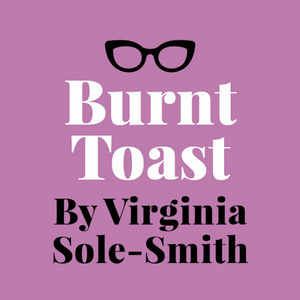
Uzyskaj bezpłatną aplikację radio.pl
- Stacje i podcasty do zakładek
- Strumieniuj przez Wi-Fi lub Bluetooth
- Obsługuje Carplay & Android Auto
- Jeszcze więcej funkcjonalności
Uzyskaj bezpłatną aplikację radio.pl
- Stacje i podcasty do zakładek
- Strumieniuj przez Wi-Fi lub Bluetooth
- Obsługuje Carplay & Android Auto
- Jeszcze więcej funkcjonalności


The Burnt Toast Podcast
Zeskanuj kod,
pobierz aplikację,
zacznij słuchać.
pobierz aplikację,
zacznij słuchać.











